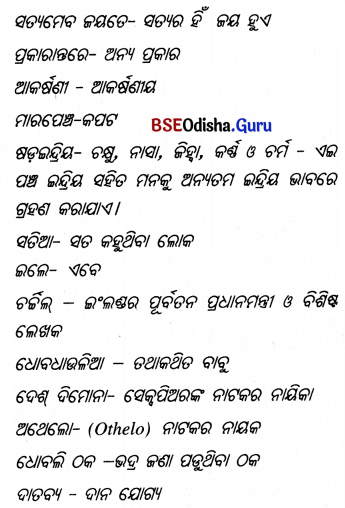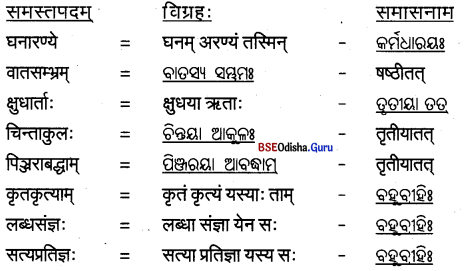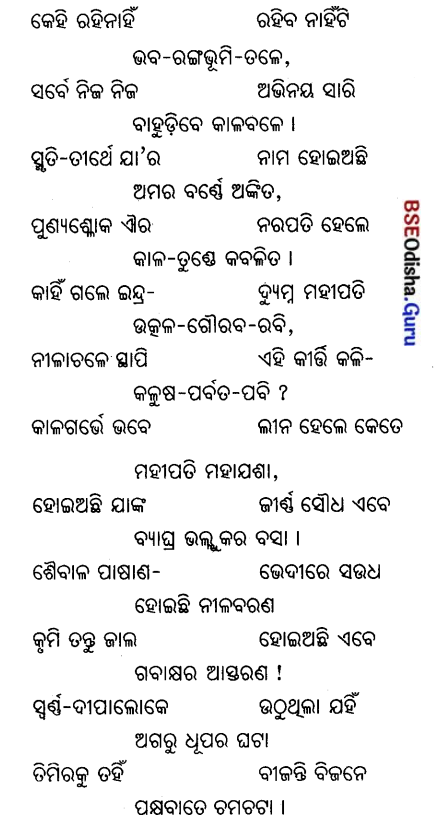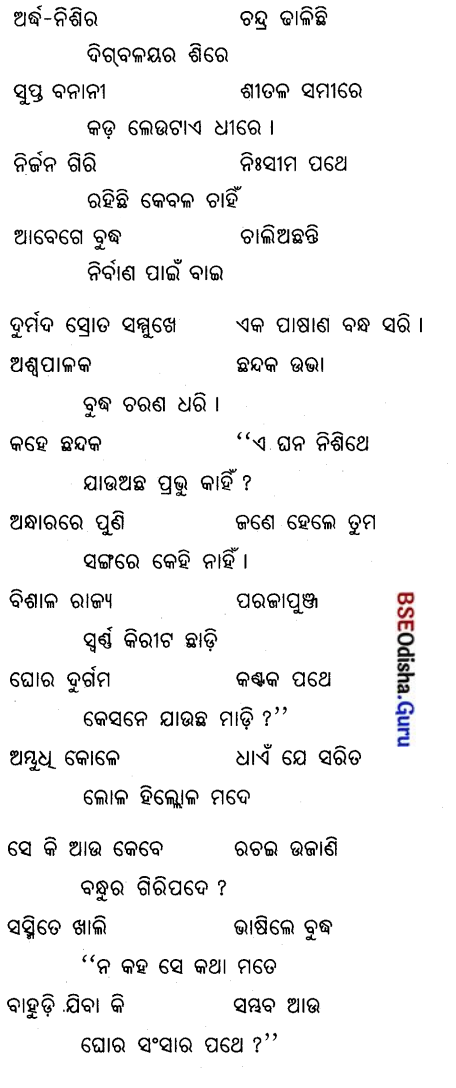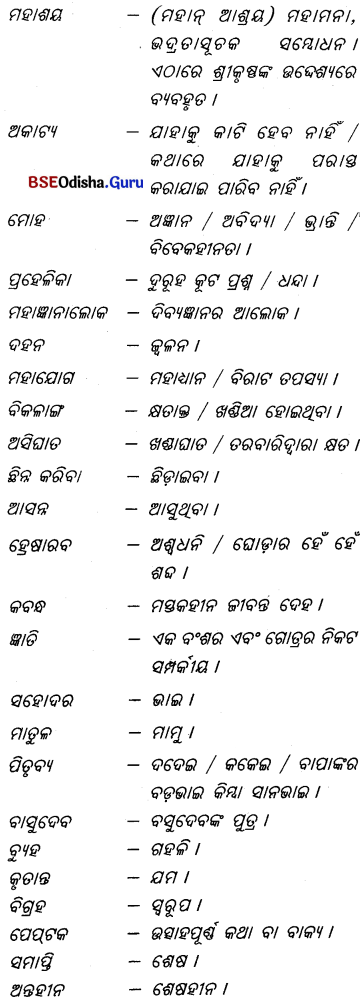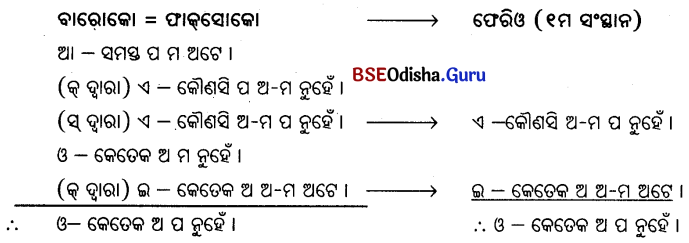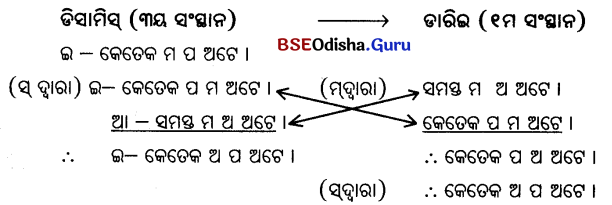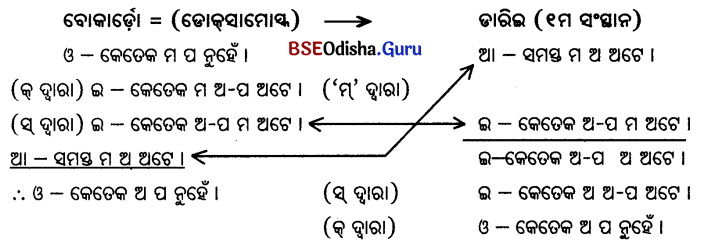Odisha State Board CHSE Odisha Class 12 Odia Solutions Grammar ଦରଖାସ୍ତ ଓ ପତ୍ରଲିଖନ Exercise Questions and Answers.
CHSE Odisha Class 12 Odia Grammar ଦରଖାସ୍ତ ଓ ପତ୍ରଲିଖନ
(କ) ଦରଖାସ୍ତ ଓ ପତ୍ରଲିଖନ
ଦରଖାସ୍ତ ଓ ପତ୍ରଲିଖନ ସମ୍ପର୍କରେ – ସାମାଜିକ, ସାଂସ୍କୃତିକ, ପାରିବାରିକ, ଆଫିସିକ, ପ୍ରଶାସନିକ, ବ୍ୟବସାୟିକ ଓ ବ୍ୟକ୍ତିଗତ ଜୀବନ ସ୍ତରରେ ଭାବବିନିମୟର ଅନ୍ୟତମ ଲିଖ ମାଧ୍ୟମ ହେଉଛି ପତ୍ର । ପତ୍ରଲିଖନଦ୍ୱାରା ପ୍ରେରକ ପ୍ରାପକ ଉଦ୍ଦେଶ୍ୟରେ ନିଜର କଥ୍ତବ୍ୟକୁ ସହଜ, ସରଳ ଓ ଗୋପନର ସହିତ ଲେଖୁ ବୁଝାଇ ଜଣାଇ ପାରିଥାଏ । ପତ୍ର ଏହି ମର୍ମରେ ହେଉଛି – ‘ଏକ ଲିଖତ ସମ୍ବାଦ; ଯାହା ଜଣେ ବ୍ୟକ୍ତି ବା ଅନୁଷ୍ଠାନଠାରୁ ଅନ୍ୟ ନିକଟକୁ ବକ୍ତବ୍ୟ, ମନ୍ତବ୍ୟ, ତଥ୍ୟ ପ୍ରେରଣ, ଖବର ପ୍ରଦାନ, ଅଭିମତ ଲିଖନ, ଭାବନା ଓ ସମସ୍ୟା ଅବଗତିକରଣ ପାଇଁ ପ୍ରେରଣ କରାଯାଇଥାଏ ।
ପତ୍ରର ପରିସର ବ୍ୟକ୍ତିଗତ ଦୁଃଖସୁଖଠାରୁ ଆରମ୍ଭକରି ଜାତୀୟ ସମସ୍ୟା, ସରକାରୀ ଘୋଷଣା, ବ୍ୟବସାୟିକ ବୁଝାମଣା ପର୍ଯ୍ୟନ୍ତ ସକଳ ଜୀବନ ଓ ସମାଜଧାରାର ଅବସ୍ଥା ସହିତ ସଂପୃକ୍ତ । ପତ୍ରରୁ ସମାଜ, ସମୟ, ମୂଲ୍ୟବୋଧ ଓ ସମସ୍ୟାର ଚିତ୍ର ମଧ୍ୟ ମିଳିଥାଏ । ମହାନ୍ ବ୍ୟକ୍ତିମାନଙ୍କ ପତ୍ର ସାର୍ବକାଳୀନ ମଣିଷ ସଭ୍ୟତାର ସମ୍ପଦ ଓ ପ୍ରେରଣା ହୋଇଉଠେ । ପୂରଣ କରି ନୂତନ ଚିନ୍ତାଧାରାର ମାର୍ଗ ବି ଖୋଲିଦିଏ । ତେଣୁ ପତ୍ର ଲେଖୁ ଏକ କଳା, ଏକ ଯୁକ୍ତି, ଏକ ବିଜ୍ଞାନସମ୍ମତ ପୂରଣ କରି ନୂତନ ଚିନ୍ତାଧାରାର ମାର୍ଗ ବି ଖୋଲିଦିଏ । ତେଣୁ ପତ୍ର ଲେଖୁ ଏକ କଳା, ଏକ ଯୁକ୍ତି, ଏକ ବିଜ୍ଞାନସମ୍ମତ ସାଧନା ।
ବର୍ଣ୍ଣନାର ସାରଲ୍ୟ, ଭାଷାର ସ୍ପଷ୍ଟତା ଓ ବୋଧଗମ୍ୟ ପ୍ରୀତିକର ଅର୍ଥଦ୍ୟୋତନା, ଗଠନରେ ଠିକଣା, ତାରିଖ, ସ୍ଥାନ, କାଳ, ପାତ୍ର ଓ ପୂର୍ଣ୍ଣ ବିବରଣୀ ପରିଷ୍କାର ଭାବରେ ପ୍ରଦାନ, ପ୍ରାପକ ଓ ପ୍ରେରକର ପରିଚିତି ଇତ୍ୟାଦି ଉତ୍ତମ ପତ୍ରର ଲକ୍ଷଣା
ଆମେ ସ।ଧାରଣ ଜୀବନରେ ବ୍ୟବହାର କରୁଥିବା ସମ୍ପର୍କରେ ଆସୁଥିବା ପତ୍ରଲିଖନ କଳା ମୁଖ୍ୟତଃ- ୧- ବ୍ୟବସାୟିକ, ୨-ବୃତ୍ତି ନିମିତ୍ତ, ୩- ବ୍ୟକ୍ତିଗତ, ୪- ସରକାରୀ କାର୍ଯ୍ୟାଳୟ ସମ୍ବନ୍ଧୀୟ, ୫- ସାମୟିକ ଛୁଟି ଓ ୬- ସମ୍ପାଦକଙ୍କୁ ପତ୍ର ଇତ୍ୟାଦି ।
୧- ବ୍ୟବସାୟିକ / ବାଣିଜ୍ୟିକ ପତ୍ରରେ ପତ୍ରର ଆରମ୍ଭରେ ପ୍ରେରକର ନାମ, ଠିକଣା, ପଦବୀ, ପତ୍ର ମଧ୍ୟରେ ପ୍ରାପକର ନାମ, ପଦବୀ, ଠିକଣା, ପତ୍ରର ଆରମ୍ଭରେ ପତ୍ରାଙ୍କ ନମ୍ବର, ତାରିଖ, ସହାୟକ ନମୁନା ଓ ବିଷୟବସ୍ତୁର ସଂକ୍ଷିପ୍ତ ସୂଚନା ଲେଖାଯାଇ ବିଷୟାନୁସାରୀ ବିବରଣୀ ପ୍ରସଙ୍ଗକ୍ରମେ ଲେଖାଯାଏ । ଶେଷରେ ପ୍ରାପକଙ୍କ ପ୍ରତି ସମ୍ମାନ ଭାବ, ବିଶ୍ବସ୍ତ ଭାବ, ମାନ୍ୟଭାବ ରହି ପ୍ରେରକର ନିଜସ୍ବ ସ୍ବାକ୍ଷର ଓ ମୋହର ରହିଥାଏ । ଏ ଧରଣର ପତ୍ର ବ୍ୟବସାୟ ପରିଚାଳନା ସହିତ ସଂଶ୍ଲିଷ୍ଟ ।
୨-ବୃତ୍ତନିମିତ୍ତ / ଆବେଦନ ପତ୍ର ସମ୍ପୂର୍ଣ୍ଣ ଆନୁଷ୍ଠାନିକ । ଏହା ଘରୋଇ ସୁଖଦୁଃଖର ଚିତ୍ର ବହନ କରିନଥାଏ । ଏହା ସରକାରୀ କିମ୍ବା ବେସରକାରୀ ସଂସ୍ଥାର ଅଧିକାରୀମାନଙ୍କ ପାଖକୁ ଲେଖାଯାଏ । ସରକାରୀ ସମସ୍ୟା, ଆଫିସିକ ସ୍ତରରେ ଅଫିସର-କର୍ମଚାରୀ-ଆଫିସିକ କର୍ତ୍ତୃପକ୍ଷଙ୍କ ଭିତରେ ସମସ୍ୟା ସମାଧାନ ଓ ତଥ୍ୟପ୍ରେରଣ ନିମନ୍ତେ ପରସ୍ପର ମଧ୍ୟରେ ଯୋଗାଯୋଗପାଇଁ ସରକାରୀ ପତ୍ର ଓ ଅର୍ଦ୍ଧସରକାରୀ ପତ୍ର ଲେଖାଯାଇଥାଏ । ଏ ଧରଣର ପତ୍ରରେ ପତ୍ରାଙ୍କ, ଦିନାଙ୍କ, ବିଷୟ, ପ୍ରେରକର ନାମ-ପଦବୀ -ଠିକଣା, ପ୍ରାପକଙ୍କ ନାମ-ପଦବୀ-ଠିକଣା ଓ ସମ୍ମାନସୂଚକ ସମ୍ବୋଧନ ସହିତ ବିଷୟ ନିର୍ଦ୍ଦିଷ୍ଟ ହୋଇ ଲେଖାଯାଇଥାଏ ।
୩-ବ୍ୟକ୍ତିଗତ | ଘରୋଇ ପତ୍ରରେ ପ୍ରେରକ ଓ ପ୍ରାପକ ମଧ୍ୟରେ ବ୍ୟକ୍ତିଗତ ସମ୍ପର୍କ, ସମ୍ବୋଧନ, ଶ୍ରଦ୍ଧା ଓ ଭକ୍ତିବୋଧ, ଆନ୍ତରିକତା, ପରିସମାପ୍ତିରେ ସମ୍ବନ୍ଧସୂଚକ ଇତି ଓ ବିଷୟ ବର୍ଣ୍ଣନାରେ ଆତ୍ମକତାର ସ୍ଵାଦ ରହିବା ଉଚିତ । ଇଷ୍ଟ ସ୍ମରଣ, ବ୍ୟକ୍ତିଗତ ସଶ୍ରଦ୍ଧା ସମ୍ବୋଧନ, ମଙ୍ଗଳ କାମନା, ସମ୍ପର୍କିତଙ୍କୁ ଯଥାମାନ୍ୟ ଦେଇ ପତ୍ର ଆରମ୍ଭ ହୁଏ ଏବଂ ଶେଷରେ ଯଥାମାନ୍ୟତାରେ ଶେଷ ହୁଏ ।
୪-ନିମନ୍ତ୍ରଣ ପତ୍ର ଓ ଶୋକସମ୍ବାଦ ଆମ ପରମ୍ପରା ଓ ସଂସ୍କୃତିର ପ୍ରତୀକଭାବରେ ପ୍ରସ୍ତୁତ କରାଯାଇଥାଏ । ଭୋଜି, ସାଂସ୍କୃତିକ ଉତ୍ସବ ପାଳନ, ବିବାହ ବ୍ରତାଦି ପାରମ୍ପରିକ ବିଧାନ, ଜନ୍ମ-ମୃତ୍ୟୁ ଇତ୍ୟାଦି ଘଟଣାରେ ପ୍ରିୟଜନମାନଙ୍କୁ ଯୋଗ ଦେବାପାଇଁ ନିମନ୍ତ୍ରଣ ପତ୍ର ଲେଖାଯାଇଥାଏ ।
ଏହି ମର୍ମରେ ଛାତ୍ରଛାତ୍ରୀଙ୍କ ଅବଗତି ଓ ପ୍ରସ୍ତୁତି ନିମନ୍ତେ ପ୍ରଶ୍ନୋତ୍ତର ଭିତ୍ତିରେ ପତ୍ରଲିଖନ କଳାର ନମୁନା ଜଣାଇବାକୁ ଯାଇ କେତୋଟି ବିଷୟ ଉପରେ ‘ପତ୍ରଲିଖନ’ କରାଯାଉଛି ।
ବାଣିଜ୍ୟିକ ଓ ବ୍ୟବସାୟିକ ପତ୍ର
୧। କାର୍ଯ୍ୟାଳୟର କେତେକ ବ୍ୟବହାର୍ଯ୍ୟ ଦ୍ରବ୍ୟ ଯୋଗାଣପାଇଁ ବ୍ୟବସାୟ ପ୍ରତିଷ୍ଠାନକୁ ଅନୁରୋଧ ପତ୍ର ଲେଖ ।
Answer:
ଦିନାଙ୍କ – ୯.୨.୨୧
ପତ୍ରାଙ୍କ ନଂ – ୧୦୦୫/୨୦୨୧ ଏଫ୍.ଡ଼ି.
ପ୍ରେରକ – ଜଗଦାନନ୍ଦ ଦାସ, ମୁଖ୍ୟ ଅଫିସ୍ ଅଧିକାରୀ,
ମଧୁପୁର ମହାବିଦ୍ୟାଳୟ, ଧର୍ମଶାଳା, ଯାଜପୁର
ପ୍ରାପ୍ତି – ପରିଚାଳକ, ଗୋକର୍ଣ୍ଣେଶ୍ଵର ସମବାୟ ଭଣ୍ଡାର, ଧର୍ମଶାଳା
ବିଷୟ ମହ।ବିଦ୍ୟାଳୟ କାର୍ଯ୍ୟାଳୟ ପରିଚାଳନା ନିମନ୍ତେ ବିବିଧ ଉପକରଣ ଯୋଗାଣ ସମ୍ବକ୍ଷରୋ
ମହାଶୟ,
ଆପଣ ଜାଣି ଖୁସିହେବେ ଯେ, ଆମ ମଧୁପୁର ମହାବିଦ୍ୟାଳୟର ପରିଚାଳନା ସମିତି ତାଙ୍କର ଅଧୂବେଶନ ନଂ ୧୦୧, ୨୮.୨.୨୧ ତାରିଖରେ ଆଗାମୀ ବର୍ଷ ନିମନ୍ତେ ସର୍ବମୋଟ ୫୦,୦୦୦/- (ପଚାଶ ହଜାର) ଟଙ୍କାର ଏକ ଆର୍ଥିକ ଅଟକଳ ବିବିଧ କାର୍ଯ୍ୟାଳୟ ସାମଗ୍ରୀ କ୍ରୟ ନିମନ୍ତେ ଅନୁମୋଦନ କରିଛନ୍ତି । ଏହି କ୍ରମରେ ଆମେ ଆପଣଙ୍କ ସମବାୟ ଭଣ୍ଡାର ମାଧ୍ୟମରେ ନିମ୍ନଲିଖ ଆଫିସିକ ଉପକରଣଗୁଡ଼ିକ କ୍ରୟ କରିବାକୁ ଚାହୁଁଛୁ । ତେଣୁ ଆପଣ ଉପଯୁକ୍ତ ଓ ଆପଣଙ୍କଦ୍ବାରା ଯୋଗାଇ ଦେବାର ସମ୍ଭାବନା ଥିବା ସର୍ବଶ୍ରେଷ୍ଠ ସାମଗ୍ରୀଗୁଡ଼ିକର ନମୁନା ସହିତ ଏକ କ୍ରୟବିକ୍ରୟଜନିତ ଅଗ୍ରିମ ଚିଠା ପ୍ରଦାନ କରିବା ହେବେ ।
ଆପଣଙ୍କଠାରୁ ଏ ସଂକ୍ରାନ୍ତରେ ଆନୁଷ୍ଠାନିକଭାବରେ ଆଣ୍ଠୁ ସମ୍ମତି ଆଶାକରୁଛୁ ଓ ଦ୍ରବ୍ୟ ଯୋଗାଣପାଇଁ ଅନୁରୋଧ କରୁଛୁ ।
ଧନ୍ୟବାଦ ସହିତ ।
ତା- ୨୮.୨.୨୧
ଆପଣଙ୍କର ବିଶ୍ଵାସ୍ତ
ଜଗଦାନନ୍ଦ ଦାସ
ମୁଖ୍ୟ ଅଫିସ୍ ଅତ୍କାରୀ
ମଧୁପୁର ମହାବିଦ୍ୟାଳୟ
ଆବଶ୍ୟକ ଉପକରଣ ଚିଠା:
୧। ଜେ. କେ. ବଣ୍ଡ ପେପର -୨୦ ରିମ୍
୨ । ଲିଙ୍କ୍ କମ୍ପାନୀ ପ୍ରସ୍ତୁତ ଡଗ୍ନ – ୧୦ ଡଜନ
୩ । ଲିଙ୍କ୍ କମ୍ପାନୀ ପ୍ରସ୍ତୁତ ଡଟ୍ଲିଡ୍ ନୀଳ କାଳିର – ୧୦ ଡଜନ
ଲିଙ୍କ୍ କମ୍ପାନୀ ପ୍ରସ୍ତୁତ ଡଟ୍ଲିଡ୍ ନୀଳ କାଳିର – ୨୦ ଡଜନ
ଲିଙ୍କ୍ କମ୍ପାନୀ ପ୍ରସ୍ତୁତ ଡଟ୍ଲିଡ୍ ଶାଗୁଆ କାଳିର – ୧୦ ଡଜନ
ଲିଙ୍କ୍ କମ୍ପାନୀ ପ୍ରସ୍ତୁତ ଡଟ୍ଲିଡ୍ କଳା କାଳିର – ୧୦ ଡଜନ
୪। ଆଲ୍ପିନ୍ – ୨୦ ପ୍ୟାକେଟ୍
୫। ଟ୍ୟାଗ୍ – ୫୦ ପ୍ୟାକେଟ୍
୬। ଷ୍ଟାପ୍ଲର ଓ ଷ୍ଟାପ୍ଲିଂ ପିନ୍ — ୧୦/୧୦ ପ୍ୟାକେଟ୍
୭ । କାଳି ବୋତଲ – ୧ ଲିଟର ନାଲି
୧ ଲିଟର କଳା
୮। ପେପର ପ୍ୟାଡ୍ – ୧୦୦ ଖଣ୍ଡ (୬୪ ପୃଷ୍ଠା ବିଶିଷ୍ଟ )
୯ । ଟେବୁଲ ଉପରର କାଚ ୨ ଫୁଟ ୨ ଫୁଟ – ୧୦ ଖଣ୍ଡ
୧୦ । ପେପର ୱେଟ୍ – ୨ ଡଜନ
୧୧ । ସାଦା ପେପର – ୧୦୦ ରିମ୍
୧୨ । ଗାରପକା ପେପର – ୫୦ ରିମ୍
୧୩ । ଛାତ୍ର ଉପସ୍ଥାନ ଖାତା – ୧୦୦ ଖଣ୍ଡ, ଲଫାପା – ୨୦୦୦ଟି
୧୪। କ୍ୟାମେଲ ଅଠା – ୫୦୦ ଗ୍ରାମ୍ ପ୍ୟାକ୍ – ୨୦ଟି
୧୫ । ଗଡ଼ରେଜ ତାଲା – ଦୁଇ ଡଜନ
୧୬ । ଚକ୍ – ୧୦୦ ଡବା, ଜଉ
୧୭ । ଡଷ୍ଟର – ୧୨ ଡଜନ
୧୮ । କଳାପଟା – ୫ ଫୁଟ / ୫ ଫୁଟ – ୧୦ ଖଣ୍ଡ
୧୯। ପେନ୍ଷ୍ଟାଣ୍ଡ୍ – ୨୦ଟି
![]()
୨ । କେତେକ ଉପକରଣ ଯୋଗାଣପାଇଁ ଏକ ନିବିଦା (କୋଟେସନ) ପ୍ରେରଣ ପ୍ରସ୍ତୁତି କର ।
Answer:
ପ୍ରେରକ – ସୁଲଭ ଭେରାଇଟି ଷ୍ଟୋର
ସହିଦ ନଗର, ଭୁବନେଶ୍ୱର
ପ୍ରାପ୍ତି – ସମ୍ମାନାୟ ନିର୍ଦ୍ଦେଣକ
ଇନ୍ଦିରା ଗାନ୍ଧୀ ମୁକ୍ତ ବିଶ୍ଵବିଦ୍ୟାଳୟ
ଓଡ଼ିଶା ଆଞ୍ଚଳିକ ଶାଖା, ଭୁବନେଶ୍ଵର ।
ବିଷୟ – କାର୍ଯ୍ୟାଳୟ ପାଇଁ ଆବଶ୍ୟକ ଉପକରଣ ଯୋଗାଣ ସମ୍ବନ୍ଧରେ ।
ମହ।ଶୟ,
ଆପଣଙ୍କ ବିଜ୍ଞପ୍ତି ନଂ- ୧୮୨, ତା ୧୨.୨.୨୧ ଅନୁସାରେ ମୁଁ ଆପଣଙ୍କ ଅନୁଷ୍ଠାନକୁ ବିଜ୍ଞପ୍ତିରେ ଆହ୍ଵାନ କରାଯାଇଥିବା ଆଫିସିକ ସାମଗ୍ରୀମାନ ଅନ୍ୟାନ୍ୟ ବିତରକମାନଙ୍କଠାରୁ ସୁଲଭ ମୂଲ୍ୟରେ ଯୋଗାଇ ଦେବାକୁ ଆଗ୍ରହ ପ୍ରକାଶ କରୁଛି । ମୁଁ ପ୍ରତିଶ୍ରୁତି ଦେଉଛି ଯେ ସୁଲଭ ଭେରାଇଟି ଷ୍ଟୋର ନୂତନ ହୋଇ ଖୋଲା ହୋଇଥିଲେ ମଧ୍ୟ ବର୍ତ୍ତମାନର ନକଲି ବଜାର କାରବାରଠାରୁ ଏହା ସମ୍ପୂର୍ଣ୍ଣ ମୁକ୍ତ ଏବଂ ମୁଁ ଗୁଣାତ୍ମକ ସାମଗ୍ରୀ ଯଥାର୍ଥ ସର୍ଭ ବା ଗ୍ୟାରେଣ୍ଟି ସହିତ ଯୋଗାଇଦେବି । ଜିନିଷଗୁଡ଼ିକ ଆପଣଙ୍କଠାରୁ ନିର୍ଦ୍ଦେଶନାମା ପାଇବାର ସାତଦିନ ମଧ୍ୟରେ ଆପଣଙ୍କ ଭଣ୍ଡାରରକ୍ଷକଙ୍କ ପାଖରେ ପହଞ୍ଚିବ । ଏହି ମର୍ମରେ ଆପଣଙ୍କ ବିଜ୍ଞପ୍ତି ଅନୁସାରେ ଏକ ବିତରକ ସର୍ଭ ଚିଠା ଓ ନମୁନା ଏଥ୍ ସହିତ ପଠାଇଲି ।
ଏଣୁ ଯଥେଷ୍ଟ ଆଶା ଓ ଭରସା ରଖୁଛି ଯେ ନୂତନ କରି ଭେରାଇଟି ଷ୍ଟୋରଟିଏ ଖୋଲି ଆତ୍ମନିର୍ଭରଶୀଳତାର ସ୍ଵପ୍ନ ଦେଖୁଥିବା ମୋ ପରି ଏକ ଶିକ୍ଷିତ ଯୁବକକୁ ଆପଣ ସାମଗ୍ରୀ ଯୋଗାଣ କରିବାର ସୁବିଧା ପ୍ରଦାନ କରିବା ହେବେ ।
ତା ୧୫.୨.୨୧
ଆପଣଙ୍କର ବିଶ୍ୱସ୍ତ
ମାନସ ରଞ୍ଜନ ବେହେରା
ବିତରକ – ସୁଲଭ ଭେରାଇଟି ଷ୍ଟୋର
ସହିଦ ନଗର, ଭୁବନେଶ୍ୱର
ବିତରଣ ସାମଗ୍ରୀ ସୂଚୀ ଓ ମୂଲ୍ୟ ରୂପରେଖ:
୧। ଲିଙ୍କ୍ ଡଟ୍ପେନ୍ – ଡଜନ୍ – ୮୦ ଟଙ୍କା (ନମୁନା ପ୍ରଦତ୍ତ)
୨। ସାଇ ଆଲ୍ପିନ୍ – ୧ ଡବା – ୩୦ ଟଙ୍କା (ନମୁନା ପ୍ରଦତ୍ତ)
୩ । ସାଇ ପେନ୍ଷ୍ଟାଣ୍ଡ – ୧ ପିସ୍ – ୧୫୦ ଟଙ୍କା (ନମୁନା ପ୍ରଦତ୍ତ)
୪ । ଲିଙ୍କ୍ ଲିଡ୍ (କଳା | ନୀଳ| ନାଲି) ପ୍ରତି ଡଜନ୍ – ୩୮ ଟଙ୍କା (ନମୁନା ପ୍ରଦତ୍ତ)
୫ । ପ୍ରିୟା ଟ୍ୟାଗ୍ – ପ୍ରତି ୧୨ ବଣ୍ଡଲ୍ – ୭୦ ଟଙ୍କା ( ନମୁନା ପ୍ରଦତ୍ତ)
୬ । ଅଫିସ୍ ପ୍ୟାଡ୍ – ୧୦୦ ପୃଷ୍ଠାବିଶିଷ୍ଟ ପ୍ରତି ଖଣ୍ଡ – ୩୦ ଟଙ୍କା
୭ । କ୍ୟାମେଲ୍ ଅଠା – ପ୍ରତି ୫୦୦ ଗ୍ରାମ୍ ବୋତଲ – ୬୦ ଟଙ୍କା (ନମୁନା ପ୍ରଦତ୍ତ )
୮। କ୍ୟାମେଲ୍ (ଏଚ୍.ବି.) ପେନ୍ସିଲ – ପ୍ରତି ଡଜନ୍ – ୫୪ ଟଙ୍କା (ନମୁନା ପ୍ରଦତ୍ତ )
୩। ନିମ୍ନମାନର ଦ୍ରବ୍ୟ ଯୋଗାଣର ପ୍ରତିବାଦ ପତ୍ରଟିଏ ଲେଖ ।
Answer:
ତାରିଖ -୧୦. ୨. ୨. ୧
ପତ୍ର ନଂ. – ୭୧୫
ପ୍ରେରଲ – କଳିଙ୍ଗ ଡିଷ୍ଟ୍ରିବ୍ୟୁଟରୁସ ଭୁବନେଶ୍ଵର
ପ୍ରାପ୍ତି – ମୁଖ୍ୟ ପରିଚାଳକ, ବର୍ଜର ରଙ୍ଗ କମ୍ପାନୀ, ମୁମ୍ବାଇ
ଓଡ଼ିଶା ପରିଚାଳନା ଶାଖା – ଭୁବନେଶ୍ବର ।
ବିଷୟ – ରଙ୍ଗର ନକଲି ଓ ପରିମାଣଗତ କମ୍ ରହିବା ଅଭିଯୋଗ ସଂପର୍କରେ ।
ମହାଣୟ,
ଦୁଃଖର ସହିତ ଜଣାଉଛୁ ଯେ, ଏସିଆନ୍ ପେଣ୍ଟ୍, ସାଲିମାର ପେଣ୍ଟ୍, ବର୍ଡର ପେଣ୍ଟ୍, କୋଣାର୍କ ପେଣ୍ଟ୍ ସହିତ ଆପଣଙ୍କ ରଙ୍ଗ କମ୍ପାନୀ ସହିତ ଚୁକ୍ତିବଦ୍ଧ ହୋଇ ଆମେ ରଙ୍ଗ ବିକ୍ରୟପାଇଁ ସାମୁଦାୟିକ ବିତରକ ଦାୟିତ୍ଵ ୫ ବର୍ଷ ଧରି ତୁଲାଇ ଆସୁଛୁ । ଆପଣଙ୍କ ରଙ୍ଗର ଚାହିଦା ଭୁବନେଶ୍ଵର ଆଞ୍ଚଳିକ ପରିସରରେ ବେଶ୍ ଯଥେଷ୍ଟ ଥିଲା । ମାତ୍ର ଏହି ତିନିମାସ ଧରି ଆପଣଙ୍କ କାଠରଙ୍ଗ ଓ ଗୃହ କାନ୍ଥରଙ୍ଗ ବିଷୟରେ ଗ୍ରାହକମାନେ ଅନେକ ଅଭିଯୋଗ ଆଣୁଛନ୍ତି । (୫ ଜଣ ଅଭିଯୋଗକାରୀଙ୍କ ପତ୍ର ସଂଯୁକ୍ତ କଲୁ) ବିଶେଷକରି ରଙ୍ଗର ଉଜ୍ଜଳତା, ଚିକ୍କଣତା ସହିତ ପ୍ରତି ପ୍ୟାକ୍ ଡବାରେ ଓଜନରେ କମ୍ ପରିମାଣ ରଙ୍ଗ ପେଷ୍ଟକ୍ ଆଦି ବିଷୟ ଉପରେ ଅଭିଯୋଗ ହେଉଛି । ଏପରିକି ଅନେକ ଗ୍ରାହକ ଉପଭୋକ୍ତା ଆଇନର ଆଶ୍ରୟ ନେବାର ଧମକ ଦେଉଛନ୍ତି ।
ଏହି ପରିପ୍ରେକ୍ଷୀରେ ଆମେ ଉନ୍ନତମାନର ରଙ୍ଗ ଯୋଗାଇ ଦେବାକୁ, ବଳକା ଥିବା ରଙ୍ଗ ଡବାଗୁଡ଼ିକ ଫେରସ୍ତ ନେବାକୁ ଓ ପୂର୍ବରୁ କ୍ରୟ କରି କ୍ଷତିରେ ପଡ଼ିଥିବା ଅସନ୍ତୁଷ୍ଟ ଗ୍ରାହକମାନଙ୍କୁ ସନ୍ତୁଷ୍ଟ କରିବାକୁ ଏହି ପତ୍ର ମାଧ୍ୟମରେ ଅନୁରୋଧ କରୁଛୁ । ଆପଣଙ୍କ ପଦକ୍ଷେପ ହିଁ ଆପଣଙ୍କ ରଙ୍ଗର ବଜାର ବିତରକ ହେବାପାଇଁ ଆଗାମୀ ଦିନରେ ଆମକୁ ସାହାଯ୍ୟ କରିବ ।
ଧନ୍ୟବାଦ ସହିତ ।
ଆପଣଙ୍କ ବିଶ୍ଵସ୍ତ
ମ୍ୟାନେଜର, କଳିଙ୍ଗ ଡିଷ୍ଟ୍ରିବ୍ୟୁଟର୍ସ
ଭୁବନେଶ୍ଵର
ବୃଭି ନିମିତ୍ତ
୪। ନିଜର ଆତ୍ମ ବିବରଣୀ (ବାୟୋଡାଟା) ସଂଯୋଗ କରି ଚାକିରି ପାଇଁ କୌଣସି ସଂସ୍ଥାକୁ ଆବେଦନ ପତ୍ରଟିଏ ଲେଖ ।
Answer:
ସମ୍ମାନନୀୟ ଓଡ଼ିଶା ଶାଟା ପରିଚାଲନା ନିର୍ଦ୍ଦେଶକ,
ହିନ୍ଦୁସ୍ଥାନ ଲିଭର କମ୍ପାନୀ, କଟକ
ମହଶୟ,
ସମ୍ମାନର ସହିତ ଲିଖ୍ ଆବେଦନ କରୁଛି ଯେ, ମୁଁ ୧୯.୨.୨୦୨୧ ତାରିଖ ଦୈନିକ ଓଡ଼ିଆ ପତ୍ରିକା ‘ସମାଜ’ରେ ପ୍ରକାଶିତ ଆପଣଙ୍କ ବିଜ୍ଞାପନ ନଂ – ୧୦୧ ରୁ ଜାଣିବାକୁ ପାଇଲି ଯେ ଆପଣଙ୍କ ଓଡ଼ିଶା ଶାଖା କାର୍ଯ୍ୟାଳୟରେ ୧୦ଗୋଟି ପରିଚାଳନା ପ୍ରତିନିଧ୍ଵ ପଦବୀ ଖାଲି ରହିଛି । ଏହି ବିଜ୍ଞାପିତ ପଦବୀରେ ନିଯୁକ୍ତି ପାଇବାପାଇଁ ମୋର ଶିକ୍ଷାଗତ ଯୋଗ୍ୟତା ଓ ସ୍ଥାନୀୟ ଅଭିଜ୍ଞତା ମଧ୍ୟ ରହିଛି । ଏହି ମର୍ମରେ ମୁଁ ମୋର ଆତ୍ମ-ବିବରଣୀ ନିମ୍ନମତେ ପ୍ରଦାନ କରୁଛି; ଯାହାକୁ ବିଚାରକୁ ନେଇ ମୋତେ ପ୍ରତ୍ୟକ୍ଷଭାବରେ ସାକ୍ଷାତ୍କାର କାର୍ଯ୍ୟକ୍ରମକୁ ଡକାଇ ମୋର ଦକ୍ଷତା ପରୀକ୍ଷଣ କରାଇବାର ଏକ ସୁଯୋଗ ମୋତେ ଦେଇ କଥ୍ତ ପଦବୀରେ ମୋତେ ନିଯୁକ୍ତ ପ୍ରଦାନ କରିବା ହେଲେ ମୁଁ ଆପଣଙ୍କ ବିଚାର ଓ ବଦାନ୍ୟତା ପାଖରେ କୃତଜ୍ଞ ହୋଇ ରହିବି ।
ଧନ୍ୟବାଦର ସହିତ ।
ତା – ୨୨.୨.୨୧
ଅ।ପଣଙ୍କର ବିଶ୍ଵସ୍ତ
ନିର୍ମଳ ଚନ୍ଦ୍ର ପରିଡ଼ା
ସା ପୋ – ବନମାଳିପୁର
ଜଗତ୍ସିଂହପପୁର
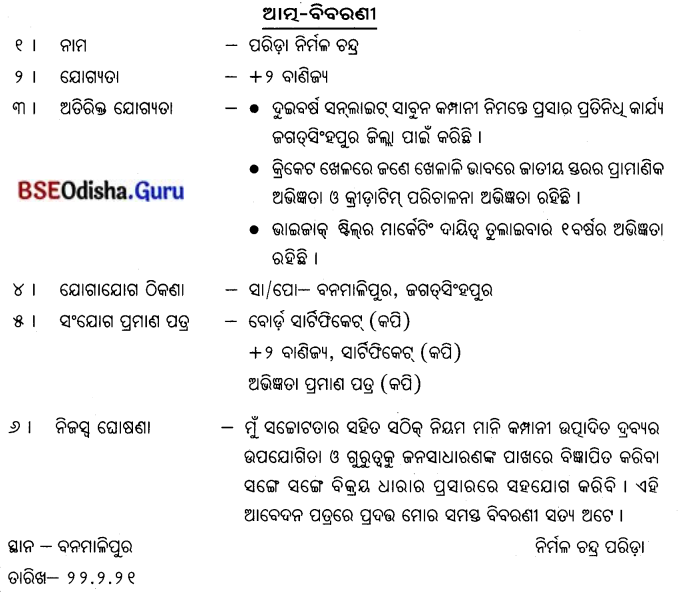
୫। ଏକ ବ୍ୟବସାୟିକ ସଂସ୍ଥାରେ ବିକ୍ରୟ ପ୍ରତିନିଧ୍ ହେବା ପାଇଁ ଆବେଦନ ପତ୍ର ଲେଖ ।
ତା ୧୯.୦୨.୨୧
ପ୍ତେରକ – ମହାଲକ୍ଷ୍କୀ ଟ୍ରେଡର୍ସ ବ୍ରହ୍ମପୁର
ପ୍ରାପ୍ତି – ପରିଚାଳକ, ସୁବର୍ଣ୍ଣା ତୈଳ ନିଗମ ଜଗତପୁର, କଟକ
ପ୍ରିୟ ମହାଶୟ,
ଆମ୍ଭେ ଦୈନିକ ‘ ଅନୁପମ ଭାରତ’ ସମ୍ବାଦପତ୍ରରେ ପ୍ରକାଶିତ ଆପଣଙ୍କ ପ୍ରଦତ୍ତ ବିଜ୍ଞାପନ ନଂ୧୦୧ରୁ ଜାଣିବାକୁ ପାଇଲୁ ଯେ ଆପଣଙ୍କ ତୈଳ କମ୍ପାନୀ ପ୍ରସ୍ତୁତ ସାମଗ୍ରୀର ବଜାର ବିକ୍ରି ବୃଦ୍ଧି ନିମନ୍ତେ ବ୍ରହ୍ମପୁର ଆଞ୍ଚଳିକ ସ୍ତରରେ କାର୍ପରଦାଜ ନିଯୁକ୍ତି ପାଇଁ ଆଗ୍ରହୀ ଅଛି । ଏହି ବ୍ୟାବସାୟିକ ଦାୟିତ୍ଵ ସମ୍ପାଦନ କରିବାପାଇଁ ଆମ୍ଭ ବ୍ୟାବସାୟିକ ପ୍ରତିଷ୍ଠାନ ‘ମହାଲକ୍ଷ୍ମୀ ଭଣ୍ଡାର’ ତରଫରୁ ଆମ୍ଭେ ସ୍ବୀକୃତି ଓ ସମ୍ମତି ପ୍ରଦାନ କରୁଅଛୁ । ଏହି ମର୍ମରେ ଜଣାଉଛୁ ଯେ ବ୍ରହ୍ମପୁର ସହରରେ ଆମର ୫୦ ଲକ୍ଷ ଅର୍ଥ ପରିମାଣର ବିବିଧ ନିତ୍ୟବ୍ୟବହାର୍ଯ୍ୟ ସାମଗ୍ରୀର ବିକ୍ରୟ ଭଣ୍ଡାର ରହିଛି । ଏହି ଭଣ୍ଡାର ଆଞ୍ଚଳିକ ସ୍ତରରେ ପ୍ରାୟଶଃ ୨୦୦ରୁ ଉଦ୍ଧ ସ୍ବୀକୃତିପ୍ରାପ୍ତ କାର୍ପରଦାଜ ତଥା ମୁଖ୍ୟ ବିତରକ ଭାବରେ ନିଯୁକ୍ତି ଦିଏ ତେବେ ଦକ୍ଷିଣ ଓଡ଼ିଶାର ମୁଖ୍ୟ ବାଣିଜ୍ୟିକ ପୀଠ ବ୍ରହ୍ମପୁର ସହରରେ ଆମ୍ଭେ ଆପଣଙ୍କ ସାମଗ୍ରୀର ପ୍ରଶଂସାସୂଚକ ବିକ୍ରୟ କରିବାପାଇଁ ଆଗ୍ରହୀ ଥିବାର ସମ୍ମତି ପ୍ରଦାନ କରୁଛୁ । ଏ ସମ୍ପର୍କରେ ଆର୍ଥିକ ଦେଣନେଣ ତଥା ସାମଗ୍ରୀ ଯୋଗାଣ ସମ୍ପର୍କରେ ଆମ ଭଣ୍ଡାର ଆପଣଙ୍କର ସମସ୍ତ ବ୍ୟାବସାୟିକ ବିଧାନକୁ ସସର୍ତ୍ତ ପାଳନ କରିବା ହେବେ ।
ଯଦି ଆପଣ ଆମକୁ ଏହି କାର୍ପରଦାଜ ତଥା ବିତରକ ହେବାର ସୁଯୋଗ ଦେବେ ତେବେ ଆମ୍ଭେ ଆପଣଙ୍କ ପାଖରେ ଆଭାରୀ ରହିବୁ ।
ଧନ୍ୟବ।ଦର ସହିତ ରହୁଛୁ।
ଏସ୍.ପି. ରାଓ
ମହାଲକ୍ଷ୍ମୀ ଗ୍ରେଡ଼ର୍ସ ବ୍ରଜ୍ଜପୁର
୬ । ଶିଳ୍ପ ସଂସ୍ଥାର ଅଧ୍ଯକ୍ଷଭାବରେ ତୁମ ସଂସ୍ଥାର କେତେକ ଅଧସ୍ତନ ପଦ ପୂରଣ ନିମିତ୍ତ ବିଜ୍ଞାପନର ନମୁନା ପ୍ରସ୍ତୁତ କରି ତାହାକୁ ଦୈନିକ ଖବରକାଗଜରେ ପ୍ରକାଶ ପାଇଁ ଅନୁରୋଧ ପତ୍ରଟିଏ ଲେଖ ।
ଶ୍ରୀ ମଦନ ମୋହନ ମୁଦୁଲି ଦୂରଭାଷ – ୦୬୮୦୨୫୫୫୧୦
ଅଧ୍ଯକ୍ଷ – ମଧୁକ୍ଷରା କ୍ଷୁଦ୍ର ଚିନି ଉଦ୍ୟୋଗ ଦୂରଛାପ – ୦୬୮୦୨୫୫୫୫୫
ନୂଆଗଡ଼, ଆସିକା, ଗଂଜାମ
ଚିଠି ନଂ – ଏମ୍. କେ – ୧୫୦ /୨୧ ତାରିଖ – ୧୦.୨.୨୧
ସମ୍ମାନନୀୟ ବିଜ୍ଞାପନ ପରିଚ।ଳକ, ପ୍ରଜ।ତନ୍ତ୍ର
ଦୈନିକ ସମ୍ବାଦ ପତ୍ରିକା, କଟକ ।
ବିଷୟ – ବିଜ୍ଞାପନ ପ୍ରକାଶନ ନିମନ୍ତେ ଆଗୁଆ ନିବେଦନାତ୍ମକ ନିର୍ଦ୍ଦେଶ ଚିଠା ।
ମହାଣୟ,
ଆପଣଙ୍କ ବହୁଳ ବିକ୍ରିସଂପନ୍ନ ଦୈନିକ ପତ୍ରିକା ପୃଷ୍ଠାରେ ଆମ ଶିଳ୍ପ ସଂସ୍ଥାରେ କେତେକ ପଦବୀ ନିମନ୍ତେ ଏକ ବିଜ୍ଞାପନ ପ୍ରକାଶନ କରିବାକୁ ନିବେଦନ କରୁଅଛୁ । ଆପଣଙ୍କ ପତ୍ରିକା ନିମନ୍ତେ ଅବିକଳ ବିଜ୍ଞାପନଟି ଏଥରେ ସଂଯୁକ୍ତ କରାଯାଇଛି ବିଜ୍ଞାପନଟି ରଙ୍ଗିନ୍, ତିନିରଙ୍ଗ ବିଶିଷ୍ଟ ଓ ପତ୍ରିକାର ମୁଖ୍ୟ ପୃଷ୍ଠାର ନିମ୍ନଭାଗକୁ ଲାଗି ୧୦ ଇଞ୍ଚ | ୧୦ ଇଞ୍ଚ ସ୍ଥାନ ମଧ୍ୟରେ ପ୍ରକାଶ କରିବାକୁ ଅନୁରୋଧ କରୁଛି । ବିଜ୍ଞାପନର ଛାପ ପରିଷ୍କାର, ଆକର୍ଷଣୀୟ ଓ ସମସ୍ତ ତଥ୍ୟ ନିର୍ଭୁଲ ରହିବା ଉଚିତ ।
ଏଥନିମନ୍ତେ ପ୍ରକାଶନଜନିତ ଖର୍ଚ୍ଚ ଆପଣ ଅର୍ଥବିଲ୍ ଓ ବିଜ୍ଞାପନ ପ୍ରକାଶିତ ୫ କିତା ସପ୍ତାହ ମଧ୍ୟରେ ଆମ ବ୍ୟାଙ୍କ୍ ଚାଲାଣ ଅଥବା ବ୍ୟାଙ୍କ ଅର୍ଥଜମା ଚିଠା ଭିଭିରେ ପଠାଇଚୁ।
ଧନ୍ୟବାଦର ସହିତ ରହୁଛୁ ।
ତା-୧୦-୦୨-୨୧
ଅ।ପଣଙ୍କର ବିଶ୍ଵସ୍ତ
ମଦନମୋହନ ମୁଦୁଲି
ତା-୧୦-୦୨-୨୧
ଅ।ଫିସିକ୍ ସିଲ୍
ସଂଯୋଗ ଚିଠା :
ବିଜ୍ଞାପନ ନଂ- ୧୦
ମଧୁକ୍ଷରା କ୍ଷୁଦ୍ର ଚିନି ଉଦ୍ୟୋଗ
ନୂଆଗଡ଼, ଆସିକା, ଗଞ୍ଜାମ
ମଧୁକ୍ଷରା କ୍ଷୁଦ୍ର ଚିନି ଉଦ୍ୟୋଗ ଏକ ସମବାୟ ଶିଳ୍ପସଂସ୍ଥା । ଏହି ସଂସ୍ଥାରେ ନିମ୍ନଲିଖ୍ ପଦବୀଗୁଡ଼ିକ ଖାଲି ରହିଛି । ଇଚ୍ଛୁକ ଯୋଗ୍ୟତାଧାରୀ ପ୍ରାର୍ଥୀ/ପ୍ରାର୍ଥୀନୀମାନେ ନିଜ ନିଜର ଆତ୍ମ-ବିବରଣୀ ସହିତ ସମସ୍ତ ପ୍ରକାର ପ୍ରମାଣ ପତ୍ରର ୩ କିତା ନକଲ ଦେଇ ଆବେଦନ କରିବା ହେବେ । ପ୍ରାର୍ଥୀ/ପ୍ରାର୍ଥୀମାନଙ୍କୁ ଲିଖ୍ ଓ ସାକ୍ଷାତ୍କାର ପରୀକ୍ଷା ଦେବାକୁ ପଡ଼ିବ । ଦରଖାସ୍ତ ଗ୍ରହଣର ଶେଷ ତାରିଖ ୨୮.୦୨.୨୧ । ବୟସସୀମା – ୩୨ ବର୍ଷରୁ କମ୍ ହୋଇଥବ । ଅନୁସୂଚିତ ଜାତି ଓ ଉପଜାତିଙ୍କ ପାଇଁ ୫ ବର୍ଷ କୋହଳ କରାଯିବ ।
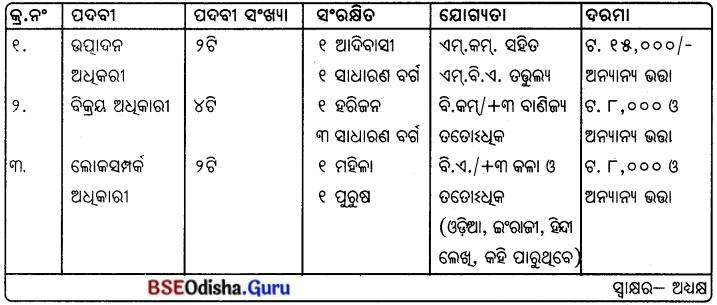
ବ୍ୟକ୍ତିଗତ ପତ୍ର
୭ । ତୁମ ଜନ୍ମଦିନ ଉତ୍ସବରେ ଯୋଗଦାନ ନିମନ୍ତେ ଅନ୍ତରଙ୍ଗ ବନ୍ଧୁଙ୍କ ନିକଟକୁ ଏକ ପତ୍ର ଲେଖ ।
ବରପାଳି
୨୬ ଫେବୃଆରୀ, ୨୦୨୧
ଅନ୍ତରଙ୍ଗ ବନ୍ଧୁ ସୁଧାଂଶୁ,
ମୋର ଆନ୍ତରିକ ଶୁଭେଚ୍ଛା ନେବୁ । ମଉସା ଓ ଲିଖୁଭାଇଙ୍କୁ ମୋର ନମସ୍କାର ଜଣାଇଦେବୁ । ମାମାକୁ ମୋର ହୃଦୟର ସ୍ନେହ ଜଣାଇବୁ । ଅନେକ ଦିନ ହେଲା ତୋର ପତ୍ରକୁ ଅପେକ୍ଷା କରି ବସିଥିବାବେଳେ ଗତକାଲି ତାହା ପ୍ରାପ୍ତ ହେବାପରେ ମୁଁ ବହୁତ ଆନନ୍ଦିତ । ତୁ ଜାଣି ଖୁସିହେବୁ ଯେ ଆସନ୍ତା ମାର୍ଚ୍ଚ ମାସ ୧୨ ତାରିଖ ଦିନ ମୋର ସପ୍ତଦଶତମ ଜନ୍ମଦିନ ପାଳିତ ହେବ । ଏହି ଅବସରରେ ସମସ୍ତ ଦୂର ଓ ନିକଟ ବନ୍ଧୁ ତଥା ଆତ୍ମୀୟ ସ୍ୱଜନମାନଙ୍କୁ ନିମନ୍ତ୍ରଣ କରାଯାଇଛି । ଏହି ପରିପ୍ରେକ୍ଷୀରେ ତୋର ଏଠାରେ ଉପସ୍ଥିତି ମୋ ପାଇଁ ଖୁବ୍ ଗୁରୁତ୍ୱପୂର୍ଣ୍ଣ । ଜନ୍ମଦିନ ପାଳନ ଅବସରରେ ସେଦିନ ସନ୍ଧ୍ୟାରେ ଏକ ଭଜନ ସନ୍ଧ୍ୟା ଓ କରିବେ । ପିଠାପଣା ସହିତ ଭୋଜିଭାତର ମଧ୍ୟ ଆୟୋଜନ କରାଯାଇଛି । ପାଶ୍ଚାତ୍ୟ ଶୈଳୀକୁ ସମ୍ପୂର୍ଣ୍ଣ ପରିହାର କରି ଆମ ନିଜସ୍ଵ ସଂସ୍କୃତି ଅନୁସାରେ ଏହି ଉତ୍ସବକୁ ବେଶ୍ ଆଡ଼ମ୍ବର ସହକାରରେ ପାଳନ କରାଯିବ । ମଉସାଙ୍କୁ ସଙ୍ଗରେ ଧରି ତୁ ନିଶ୍ଚୟ ୧୧ ତାରିଖ ଦିନ ଆମ ଘରେ ପହଞ୍ଚୁ । ମାମା ଆସିବା ମଧ୍ୟ ଖୁବ୍ ଗୁରୁତ୍ଵପୂର୍ଣ୍ଣ । ତୁ ଏଠାକୁ ଆସିବାପରେ ଆମେ ସମସ୍ତେ ମିଳିମିଶି ମା ସମଲେଶ୍ୱରୀଙ୍କୁ ଦର୍ଶନ କରିବାକୁ ଯିବା । +୨ ପରୀକ୍ଷା ଶେଷ ହେବା ପରେ ମୁଁ ମଧ୍ୟ ତମ ଘରକୁ ଯିବି । ମୋର ଏହି ପତ୍ରକୁ ନିମନ୍ତ୍ରଣ ମନେକରି ନିଶ୍ଚୟ ଆସିବୁ । ତୁ ଆସିବା ପରେ ଅନେକ ପୁରୁଣା କଥା ସବୁ ଆଲୋଚନା କରିବା । ଆଜି ପାଇଁ ଏତିକିରେ ରହୁଛି ।
। ଇତି ।
ତୋର ବନ୍ଧୁ
ଅସିତ୍

୮। ଜାତୀୟ ସମର ଶିକ୍ଷାର୍ଥୀ ବାହିନୀରେ ଯୋଗଦେବା ନିମନ୍ତେ ଅନୁମତି ପ୍ରଦାନ କରିବାକୁ ପିତାଙ୍କ ନିକଟକୁ ପତ୍ର ଲେଖ ।
ରାଜଧାନୀ କନିଷ୍ଠ ମହାବିଦ୍ୟାଳୟ ଭୁବନେଶ୍ଵର
୨୪ ଫେବୃଆରୀ ୨୦୨୧
ପରମ ପୂଜାସ୍ପଦ ବାପା,
ମୋର ଭକ୍ତିପୂତ ପ୍ରଣାମ ଗ୍ରହଣ କରିବେ । ମାଆଙ୍କୁ ମୋର ପ୍ରଣାମ ଜଣାଇଦେବେ । ମୁନିକୁ ମୋର ସ୍ନେହାଶୀର୍ବାଦ । ଗତକାଲି ଆପଣଙ୍କ ପତ୍ର ପ୍ରାପ୍ତ ହୋଇ ଘର କଥା ଜାଣିବାକୁ ପାଇଲି । ଏକ ବିଶେଷ ଆବଶ୍ୟକତା ନିମନ୍ତେ ଆପଣଙ୍କ ଅନୁମତି ଲୋଡ଼ି ଏ ପତ୍ର ଲେଖୁଛି ।
ଆପଣ ଜାଣିଛନ୍ତି ଯେ ଛାତ୍ରଛାତ୍ରୀମାନଙ୍କୁ ଦେଶସେବା, ପୀଡ଼ିତମାନଙ୍କର ସେବା ତଥା ବିପଦ ସମୟରେ ଅନ୍ୟମାନଙ୍କ ସେବା ଶିକ୍ଷା ଦେବା ନିମନ୍ତେ ସରକାର ବାଳଚର ଓ ଜାତୀୟ ସମର ଶିକ୍ଷାର୍ଥୀ ବାହିନୀର ପ୍ରଚଳନ କରାଇଛନ୍ତି । ଏଣୁ ମୁଁ ଆମ ମହାବିଦ୍ୟାଳୟରେ ଥିବା ଏନ୍.ସି.ସି.ରେ କାର୍ଯ୍ୟ କରିବାକୁ ଇଚ୍ଛା କରୁଛି । ଏହାର କାରଣ ହେଉଛି ଏହି ପ୍ରଶିକ୍ଷଣ ମାଧ୍ୟମରେ · ଶୃଙ୍ଖଳାବୋଧ ଓ ଦେଶାତ୍ମବୋଧ ଚେତନା ବୃଦ୍ଧି ପାଇଥାଏ । ଏହା ସହିତ ଉଚ୍ଚତର ଅଧ୍ୟୟନ କ୍ଷେତ୍ରରେ ଏବଂ ସରକାରୀ ଚାକିରୀ କ୍ଷେତ୍ରରେ ଏହି ସଂସ୍ଥାରୁ କୃତିତ୍ଵର ସହ ଉତ୍ତୀର୍ଣ୍ଣ ହୋଇଥିବା ଛାତ୍ରଛାତ୍ରୀଙ୍କୁ ଅନେକ ସୁବିଧା ପ୍ରଦାନ କରାଯାଇଥାଏ । ଏଥିରେ ଯୋଗଦେବା ନିମନ୍ତେ ମୁଁ ଆମ ମହାବିଦ୍ୟାଳୟର ଏନ୍.ସି.ସି. ପ୍ରଶିକ୍ଷକଙ୍କ ଅନୁମତି ପ୍ରାପ୍ତ ହୋଇସାରିଛି । ଆପଣଙ୍କ ଅନୁମତି ପ୍ରାପ୍ତ ହେବା ପରେ ମୁଁ ଆବଶ୍ୟକ ଦେୟ ପୈଠ କରିବା ସହିତ ଏହି ସଂସ୍ଥାରେ ନାମ ଲେଖାଇବି । ତାହା ବିଦ୍ୟାଳୟର ଶିକ୍ଷାଦାନ ବାହାର ସମୟରେ ଏହି ବିଷୟ ପ୍ରଶିକ୍ଷଣ ଦିଆଯିବାର ବ୍ୟବସ୍ଥା ଥିବାରୁ ମୋର ଶିକ୍ଷାଲାଭ କ୍ଷେତ୍ରରେ ଏହା କୌଣସି ପ୍ରତିବନ୍ଧକ ସୃଷ୍ଟି କରିବ ନାହିଁ ।
ଏଣୁ ସମସ୍ତ ତଥ୍ୟ ଅବଗତ ହେବାପରେ ମୋତେ ଏଥରେ ଭର୍ତ୍ତି ହେବାକୁ ଆପଣ କୁଣ୍ଠିତ ହେବେ ନାହିଁ ବୋଲି ମୋର ବିଶ୍ଵାସ । ଅନ୍ୟ ସମସ୍ତ ବିଷୟ ପରେ ଜଣାଇବି । ଆପଣଙ୍କ ଅନୁମତି ଅପେକ୍ଷାରେ –
। ଇତି ।
ଆପଣଙ୍କ ସ୍ନେହାଧୀନ ପୁତ୍ର
ରିକୁ

୯ । ତୁମ ସାନଭଉଣୀର ବିବାହ ଉତ୍ସବରେ ଯୋଗ ଦେବା ପାଇଁ ଅନୁରୋଧ ଜଣାଇ ସାଙ୍ଗ ନିକଟକୁ ପତ୍ର ଲେଖ ।
ବିରଜା ରୋଡ୍
ତା ୭ । ୩ ।୨୦୨୧
ପ୍ରିୟ ସୁରେଶ,
ମୋର ଶୁଭେଚ୍ଛା ଗ୍ରହଣ କରିବ । ମଉସା, ମାଉସୀ ଓ ଅନ୍ୟାନ୍ୟ ଗୁରୁଜନମାନଙ୍କୁ ମୋର ଭକ୍ତିପୂତ ପ୍ରଣତି ଜଣାଇଦେବ । ମୋର ଲେଖୁର କାରଣ ଏହିକି ଯେ ଆମ ଝୁନାର ବାହାଘର ସ୍ଥିର ହୋଇଯାଇଛି । ମାର୍ଚ୍ଚ ୧୭ ତାରିଖରେ ଆଉ ମାତ୍ର ୧୦ ଦିନ ପରେ ଅନୁଷ୍ଠିତ ହେବ । ବାପା ଓ ମମି ଏ ବାବଦରେ ମଉସା ଓ ମାଉସୀଙ୍କ ସହିତ ଭଲ ଭାବରେ କଥାବାର୍ତ୍ତା ହୋଇ ସାରିଛନ୍ତି । ତୋତେ ମୋର କହିବା କଥା ହେଉଛି ତୁ ତାଙ୍କ ସହିତ ନିଶ୍ଚୟ ଆମ ଘରକୁ ଆସି ବିବାହ କାର୍ଯ୍ୟରେ ସାହାଯ୍ୟ କରିବ । ମୁଁ ଜାଣେ ଯେ ପରୀକ୍ଷା ନିକଟ ହେଲାଣି; ନିଶ୍ଚୟ ଅସୁବିଧା ହେବ । ତେବେ ତୁ ନ ଆସିଲେ ମନ ଆଦୌ ଭଲ ଲାଗିବ ନାହିଁ । ଝୁନା ମୋତେ ବାରମ୍ବାର ତାଗିଦ୍ କରିଛି । ତା’ର ଯୁକ୍ତି ସୁରେଶ ଭାଇ ଯଦି ନ ଆସିବେ ତେବେ ମୁଁ ଜାଣିବି ମୁଁ ତାଙ୍କର ଭଉଣୀ ନୁହେଁ, ସେ ମୋତେ ମିଛରେ ଭଣ୍ଡାଉଥିଲେ । ବହୁତ କାର୍ଯ୍ୟ ଅଛି । ବର୍ତ୍ତମାନ ମୁଁ ଆଉ ବିଶେଷ ଲେଖୁନି । ତୁ ଆସିଲେ ସବୁ କଥା ହେବା । ତୁମେମାନେ ସମସ୍ତେ ସେଠାରେ ଭଲରେ ଥିବ । ଆମେମାନେ ଏଠାରେ ଭଲରେ ଅଛୁ । ତୋ ଆସିବା ପ୍ରତୀକ୍ଷାରେ ରହୁଛି ।
। ଇତି ।
ତୁମର ପ୍ରିୟ ସାଙ୍ଗ
ରତିକାନ୍ତ

୧୦ । ମାତୃ ବିୟୋଗ ଘଟିଥିବା ଜନୈକ ବନ୍ଧୁଙ୍କ ନିକଟକୁ ଏକ ସାତ୍ତ୍ବନାମୂଳକ ପତ୍ର ଲେଖ ।
କୋଟପାଡ଼, କୋରାପୁଟ
ତା ୨୬ ଫେବୃଆରୀ, ୨୦୨୧
ପ୍ରିୟ ସ।ଗର,
ମୋର ଶୁଭେଚ୍ଛା ଗ୍ରହଣ କରିବୁ । ମଉସା ଓ ଅନ୍ୟ ଗୁରୁଜନମାନଙ୍କୁ ମୋର ପ୍ରଣାମ । ସାନମାନଙ୍କୁ ସ୍ନେହ । ବିନୋଦ ପାଖରୁ ତୋର ଦୁଃଖଦ ସମ୍ବାଦ ଶୁଣିଲା ପରଠାରୁ ମୁଁ ଏବଂ ପରିବାରର ଲୋକମାନେ ସ୍ତବ୍ଧ ଓ ମ୍ରିୟମାଣ ହୋଇଯାଇଛୁ । ମାଉସୀଙ୍କ ମୃତ୍ୟୁ ଖବର ମୋ ପାଇଁ ବିନା ମେଘେ ବଜ୍ରପାତ ତୁଲ୍ୟ ଥିଲା । ସେ ଯେ ଆଉ ଇହ ଜଗତରେ ନାହାଁନ୍ତି ଏହା ମୁଁ ବିଶ୍ୱାସ କରିପାରୁନି । ଆମ ସମସ୍ତଙ୍କୁ ଶୋକ ସାଗରରେ ଭସାଇ ସେ ଯେ ଚାଲିଯିବେ, ଏକଥା କିଏ ବା କଳ୍ପନା କରିଥିଲା । ସତରେ ବିଧାତାଙ୍କ ବିଧାନ ବଡ଼ ବିଚିତ୍ର । ମାଉସୀଙ୍କ ପରି ସ୍ନେହଶୀଳା, ଧର୍ମପ୍ରାଣ ଓ ଆଦର୍ଶ ସ୍ଥାନୀୟା ମହିଳା ଏ ସଂସାରରେ ବିରଳ । ତାଙ୍କର ବିୟୋଗ କେବଳ ତମ ପରିବାର ପାଇଁ ନୁହେଁ, ଆମ ସମସ୍ତଙ୍କ ପାଇଁ ଏକ ଅପୂରଣୀୟ କ୍ଷତି । ତାଙ୍କର ସହାସ୍ୟ ବଦନ, ମଧୁର ଓ ରସସିକ୍ତ ବଚନ ଏବେ ମଧ୍ୟ ଆଖ୍ ସାମ୍ନାରେ ନାଚି ଉଠୁଛି । ତୋର ବନ୍ଧୁ ଭାବରେ ମୁଁ ତାଙ୍କଠାରୁ ଯେଉଁ ଅକପଟ ସ୍ନେହ ପାଇଛି, ଯେଉଁ ଅପତ୍ୟବୋଧ ଲାଭ କରିଛି, ତାହା ଚିରଦିନ ମୋ ହୃଦୟରେ ଜୀବନ୍ତ ହୋଇ ରହିବ । ମୁଁ ଜାଣେ ଜଣେ ଅନୁଭବୀ ହିଁ ମାତୃ- ବିୟୋଗର ଦୁଃଖକୁ ଜାଣିପାରିବ । ଏ ଶୂନ୍ୟତା ଏ ଅଭାବବୋଧ କେବଳ ତୋର ନୁହେଁ ଆମ ସମସ୍ତଙ୍କର । ଭବିତବ୍ୟ ଯାହା ତାହା ଅବଶ୍ୟ ଘଟିବ । କେହି ଏହାକୁ ଅମାନ୍ୟ କରିପାରିବେ ନାହିଁ । ମାଉସୀଙ୍କ ଅଧୁରା ସ୍ଵପ୍ନକୁ ତୋତେ ପୂରଣ କରିବାକୁ ହେବ । ଏହାହିଁ ତାଙ୍କ ପ୍ରତି ତୋର ଶ୍ରେଷ୍ଠ ଉପହାର । ପରିବାରର ଜ୍ୟେଷ୍ଠ ସନ୍ତାନ ଭାବରେ ଏହି ଦୁଃଖଦ ପରିସ୍ଥିତିର ମୁକାବିଲା କରିବା ସହିତ ସାନଭାଇ ଓ ଭଉଣୀମାନଙ୍କୁ ସାନ୍ତନା ଦେବୁ ।
ମର୍ତ୍ତ୍ୟ ମଣ୍ଡଳେ ଦେହ ବହି, ଦେବତା ହୋଇଲେ ମରଇ । ମାଆଙ୍କର ଆତ୍ମା ସ୍ବର୍ଗରେ ଶାନ୍ତିରେ ରହୁ । ସେହିଠାରୁ ସେ ତାଙ୍କ ଆଶୀର୍ବାଦର ଅଭୟ ହାତ ତୋ ମୁଣ୍ଡରେ ରଖୁ’ନ୍ତୁ । ଏତିକି ମୁଁ ଈଶ୍ଵରଙ୍କ ନିକଟରେ ପ୍ରାର୍ଥନା କରୁଛି । ମୁଁ ତୁମ ଘରକୁ ଗଲେ ମୋ ସହିତ ଏଠାକୁ ନେଇ ଆସିବି । ବର୍ତ୍ତମାନ ପାଇଁ ରହୁଛି । ଅନ୍ୟସବୁ ସାକ୍ଷାତ୍ରେ ।
। ଇତି ।
ପ୍ରେରକ : ବିବେକ ପରିଡ଼ା

୧୧ । ତୁମେ ପଢ଼ୁଥିବା ମହାବିଦ୍ୟାଳୟର କେତେକ ସମସ୍ୟା ସମ୍ପର୍କରେ ଜଣାଇ ପିତାଙ୍କ ନିକଟକୁ ଖଣ୍ଡିଏ ପତ୍ର ଲେଖ ।
ରଘୁନାଥପୁର ମହାବିଦ୍ୟାଳୟ, ରଘୁନାଥପୁର
୫ ଫେବୃଆରୀ, ୨୦୨୧
ପୂଜାଧାର ବାପା,
ମୋର ପ୍ରଣାମ ନେବେ । ମାଆଙ୍କୁ ଓ ସାଆନ୍ତବାପାଙ୍କୁ ମୋର ଭୂମିଷ୍ଠ ପ୍ରଣାମ ଜଣାଇବେ । ଆପଣଙ୍କ ପ୍ରେରିତ ପତ୍ର ମୁଁ ପାଇଛି । ଆମ ମହାବିଦ୍ୟାଳୟର ପଢ଼ାପଢ଼ି ତଥା ଅନ୍ୟାନ୍ୟ ଖବର ଜାଣିବାପାଇଁ ଆପଣ ଲେଖୁଛନ୍ତି । ମୁଁ ସେ ବିଷୟରେ ଲେଖୁଛି ।
ଆମ ମହାବିଦ୍ୟାଳୟର +୨ ପରୀକ୍ଷାଫଳ ସମ୍ବନ୍ଧରେ ଯଥେଷ୍ଟ ସୁନାମ ରହିଛି । ଅନେକ ସୁଯୋଗ୍ୟ, ଅଶେଷ ଅଭିଜ୍ଞତାସଂପନ୍ନ, ବିଜ୍ଞ ଅଧ୍ୟାପକମାନେ ଏଠାରେ ଆଜିଯାଏ ଶିକ୍ଷାଦାନ କରି ଆସୁଥିଲେ । ଏଠାରେ ଛାତ୍ରଛାତ୍ରୀଙ୍କ ସଂଖ୍ୟା ବି ବହୁତ । କିନ୍ତୁ: ଦୁଃଖର କଥା ବାପା, ଗତବର୍ଷ ଆମ ମହାବିଦ୍ୟାଳୟର ବହୁଜନପ୍ରିୟ ଅଧ୍ୟକ୍ଷ ଅବସର ନେଇଛନ୍ତି । ଗଣିତ, ରାସାୟନ ବିଜ୍ଞାନ ଓ ଇଂରାଜୀ ପଢ଼ାଉଥ୍ ଆଉ ଚାରିଜଣ ଅଧ୍ୟାପକ ନିକଟରେ ଏକାସାଙ୍ଗରେ ରିଟାୟାର୍ଡ କରିଗଲେ । ବର୍ତ୍ତମାନ ଏଠାରେ ପାଞ୍ଚଜଣ ଅଧ୍ୟାପକଙ୍କର ଅଭାବ ରହିଛି । ମହାବିଦ୍ୟାଳୟର ସର୍ବକନିଷ୍ଠ ଜଣେ ଅଧ୍ୟାପକ ଏବେ ଭାରପ୍ରାପ୍ତ ଅଧ୍ୟକ୍ଷ ରୂପେ କାର୍ଯ୍ୟ କରୁଛନ୍ତି । ମହାବିଦ୍ୟାଳୟର ଶୈକ୍ଷିକ ପରିବେଶ ଅତ୍ୟନ୍ତ ବିଶୃଙ୍ଖଳିତ ହୋଇଯାଇଛି । ମହାବିଦ୍ୟାଳୟ କମିଟି ଅତ୍ୟନ୍ତ ଜରାଜୀର୍ଣ୍ଣ । ବିଙ୍ଗ ଛାତରୁ ଖଣ୍ଡେ ଖଣ୍ଡେ ଖସି ପଡ଼ିଲାଣି । ମହାବିଦ୍ୟାଳୟ ଛାତ୍ରାବାସରେ ପିଲାସଂଖ୍ୟା କମି କମି ୧୬|୧୭ କୁ ଆସିଗଲାଣି । ଏଠାରେ ଖୁଆପିଆ ଓ ପଢ଼ାପଢ଼ିରେ ନାନାଦି ସମସ୍ୟା ସୃଷ୍ଟି ହେଉଛି ।
ତଥାପି ବାପା, ହତୋତ୍ସାହିତ ନ ହୋଇ ଆମେ ଚଳିତବର୍ଷର କେତେଜଣ ଭଲପିଲା ନିଜ ଉଦ୍ୟମରେ ପାଠ୍ୟ-ପ୍ରସ୍ତୁତି ଠିକ୍ ଠିକ୍ ଚଳାଇଛୁ । ଏହି ଶିକ୍ଷାୟତନର ସବୁ ପ୍ରତିକୂଳ ପରିସ୍ଥିତି ସତ୍ତ୍ଵେ ମୁଁ ଆସନ୍ତା +୨ ପରୀକ୍ଷାରେ ଭଲ କରିବି ବୋଲି ଆଶା ରଖୁଛି । ସମୟ ପାଇଲେ ଜଣେ ଅଭିଭାବକ ହିସାବରେ ଆପଣ ଏହି ସମସ୍ୟା ସମ୍ବନ୍ଧରେ ଶିକ୍ଷାସଚିବଙ୍କୁ ଲେଖୁ ଜଣାଇବେ । ଚିଠି ପାଇ ଚିଠି ଦେବେ । ଆଶା କରୁଛି ଆପଣ ଓ ଅନ୍ୟମାନଙ୍କ ଦେହ ଭଲଥିବ । ଇତି ।
ଅ।ପଣଙ୍କର ସ୍ନେହର ଅଙ୍କିତା
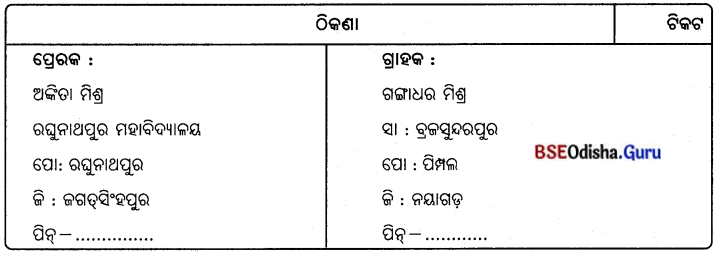
ସରକାରୀ କାର୍ଯ୍ୟାଳୟ ସମ୍ବନ୍ଧୀୟ ଆବେଦନ ପତ୍ର (ଦରଖାସ୍ତ)
୧୨ । ମହାବିଦ୍ୟାଳୟ ପଡ଼ିଆରେ ଏକ କ୍ରୀଡ଼ା ପ୍ରତିଯୋଗିତା କରିବା ନିମନ୍ତେ ଅଧ୍ୟକ୍ଷଙ୍କ ଅନୁମତି ପାଇଁ ଏକ ଦରଖାସ୍ତ ଲେଖ ।
ମାନନୀୟ,
ଶ୍ରୀଯୁକ୍ତ ଅଧ୍ୟକ୍ଷ, କ୍ଷେତ୍ରମୋହନ ମହାବିଦ୍ୟାଳୟ, ଶାଳପଡ଼ା
ମହେ।ଦୟ – – – – – – – – – – – – – – ସମୀପେଷୁ
ବିଷୟ – କ୍ରୀଡ଼ା ପ୍ରତିଯୋଗିତା ପାଇଁ ଅନୁମତି ପ୍ରାର୍ଥନା ।
ମହାଣୟ,
ବିନମ୍ରତାର ସହିତ ନିବେଦନ ଏହିକି ଆମ୍ଭେ ଆପଣଙ୍କ ମହାବିଦ୍ୟାଳୟର +୨ ପ୍ରଥମ ବର୍ଷ ଛାତ୍ରମାନେ +୨ ଦ୍ଵିତୀୟ ବର୍ଷର ଛାତ୍ରମାନଙ୍କ ସହିତ ଏକ ବନ୍ଧୁତ୍ଵପୂର୍ଣ୍ଣ ଫୁଟବଲ ମ୍ୟାଚ୍ ଆସନ୍ତା କାଲି ଅପରାହ୍ନ ୩ ଘଟିକା ସମୟରେ ଖେଳିବାକୁ ଚାହୁଁଛୁ । ଆମ ମହାବିଦ୍ୟାଳୟ ପଡ଼ିଆରେ ଖେଳ ହେବ ଏବଂ ଖେଳ ପରିଚାଳନା କରିବାପାଇଁ ଆମ ଖେଳ ଶିକ୍ଷକ ତାଙ୍କର ସଦୟ ସ୍ବୀକୃତି ଦେଇଛନ୍ତି । ଏହି ଖେଳ ହେବାଦ୍ୱାରା ଛାତ୍ରଛାତ୍ରୀମାନଙ୍କ ମଧ୍ୟରେ ପ୍ରତିଯୋଗୀ ମନୋଭାବ ବୃଦ୍ଧି ପାଇବ । ଖେଳାଳିମାନେ ନିଜର କ୍ରୀଡ଼ାନୈପୁଣ୍ୟ ପ୍ରଦର୍ଶନ କରିବାର ସୁଯୋଗ ପାଇବେ ଏବଂ ଖେଳ ଦେଖୁ ଅନ୍ୟ ଛାତ୍ରଛାତ୍ରୀମାନେ ପ୍ରଫୁଲ୍ଲିତ ହୋଇ ଉଠିବେ ।
ତେଣୁ ବିନୀତ ପ୍ରାର୍ଥନା କରୁକି ଆପଣ ଦୟାପରବଶ ହୋଇ ଏହି କ୍ରୀଡ଼ା ପ୍ରତିଯୋଗିତା ଅନୁଷ୍ଠିତ ହେବାପାଇଁ ଆମ୍ଭମାନଙ୍କୁ ଅନୁମତି ପ୍ରଦାନ କଲେ ଆମ୍ଭେମାନେ ଆପଣଙ୍କ ନିକଟରେ ଚିର-ଉପକୃତ ହୋଇ ରହିବୁ ।
କ୍ଷେତ୍ରମୋହନ ମହାବିଦ୍ୟାଳୟ,
ଶାଳପଡ଼ା
ତା ୭. ୨. ୨୦୨୧
ଇତି
ଅ।ପଣଙ୍କର ଆଜ୍ଞାଧୀନ ଛାତ୍ରଛାତ୍ରା
ମହେନ୍ଦ୍ର ମାଝୀ,
ଶ୍ରେଣୀ ପ୍ରତିନିଧ୍, +୨ ପ୍ରଥମ ବର୍ଷ
ରଞ୍ଜତା ମହାରଣା
ଶ୍ରେଣୀ ପ୍ରତିନିଧ୍, +୨ ଦ୍ବିତୀୟ ବର୍ଷ
![]()
୧୩ । ପାନୀୟ ଜଳ ପାଇଁ ତୁମ ଗ୍ରାମରେ ନଳକୂଅ ଖୋଳାଇବାକୁ ବି.ଡ଼ି.ଓ.ଙ୍କ ନିକଟକୁ ଦରଖାସ୍ତ ଲେଖ ।
ମାନନୀୟ
ଶ୍ରୀଯୁକ୍ତ ବ୍ଲକ୍ ଉନ୍ନୟନ ଅଧିକାରୀ, ଋଣପୁର
ମହୋଦୟ ………………………….. ସମୀପେଷୁ ।
(ବୃନ୍ଦାବନପୁର ଗ୍ରାମପଞ୍ଚାୟତର ସରପଞ୍ଚଙ୍କ ଜରିଆରେ)
ବିଷୟ – ନଳକୂପ ଖୋଳାଇବାପାଇଁ ପ୍ରାର୍ଥନା ।
ମହାଶୟ,
ବିନମ୍ରତାର ସହିତ ଆମ୍ଭେ ସା: – ବ୍ରଜସୁନ୍ଦରପୁର, ପୋ:- ପିମ୍ପଲ, ଜି:- ନୟାଗଡ଼ର ଗ୍ରାମବାସୀବୃନ୍ଦ ନିମ୍ନଲିଖ୍ ବିଷୟ ପ୍ରତି ଆପଣଙ୍କର ଦୟାର୍ଦ୍ର ଦୃଷ୍ଟି ଆକର୍ଷଣ କରୁଅଛୁ ।
ଦୁଃଖ ଓ ପରିତାପର ବିଷୟ, ସ୍ଵାଧୀନତାର ଦୀର୍ଘ ଅର୍ଦ୍ଧଶତାବ୍ଦୀ ଅତିକ୍ରାନ୍ତ ହେବା ସତ୍ତ୍ବେ ମଧ୍ୟ ଆମ ଗ୍ରାମରେ ଏଯାବତ୍ ଗୋଟିଏ ବି ଆଦର୍ଶ ସ୍ବଚ୍ଛ ନୀରଭରା ପୁଷ୍କରିଣୀ ନାହିଁ। ଅତିକ୍ଷୁଦ୍ର ଦୁଇ ତିନୋଟି ପଙ୍କ ଓ ଦଳପୂର୍ଣ୍ଣ ଜଳାଶୟ ଆମ୍ଭମାନଙ୍କର ବର୍ଷବ୍ୟାପୀ ସ୍ନାନ ଓ ପାନୀୟରେ ସହାୟକ ହୋଇଥାଏ । ପ୍ରଦୂଷିତ ଜଳ ଯୋଗୁଁ ବର୍ଷର ଅଧିକାଂଶ ଋତୁରେ ଆମ୍ଭମନଙ୍କୁ ରୋଗାକ୍ରାନ୍ତ ହୋଇ ପ୍ରତିକୂଳ ସ୍ବାସ୍ଥ୍ୟର ଶିକାର ହେବାକୁ ପଡ଼େ । ପ୍ରାୟ ଦୁଇ ହଜାରରୁ ଅଧିକ ଲୋକସଂଖ୍ୟାବିଶିଷ୍ଟ ଆମ ଗ୍ରାମରେ ଅନ୍ଯୂନ ୨ଟି ଗଭୀର ନଳକୂପ ଖନନ କରାଯାଇ ପାରିଲେ ସବୁଦିନପାଇଁ ଆମ୍ଭେମାନେ ପାନୀୟ ଜଳ ସମସ୍ୟାରୁ ନିଷ୍କୃତି ଲାଭ କରନ୍ତୁ ।
ତେଣୁ ବିନୀତ ପ୍ରାର୍ଥନା କରୁକି, ଆପଣ ସଦୟହୃଦୟ ହୋଇ ଆମ ଗ୍ରାମର ମଧ୍ଯ ଓ ପ୍ରାନ୍ତ ଭାଗରେ ଦୁଇଟି ଗଭୀର ନଳକୂପ ଖେଳାଇବାପାଇଁ ମଞ୍ଜୁରୀ ପ୍ରଦାନ କଲେ ଆମ୍ଭେମାନେ ଆପଣଙ୍କ ନିକଟରେ ଚିରରାଣୀ ହୋଇ ରହିବୁ।
ବ୍ରଜସୁନ୍ଦରପୁର
ତା ୮-୨-୨୦୨୧
। ଇତି ।
ଆପଣଙ୍କର ବିଶ୍ଵସ୍ତ
ବ୍ରଜସୁନ୍ଦରପୁର ଗ୍ରାମବାସୀବୃନ୍ଦ
୧. ସର୍ବେଶ୍ୱର ତ୍ରିପାଠୀ
୨. ଚନ୍ଦ୍ରଶେଖର ମିଶ୍ର
୩. କିଶୋର ଚନ୍ଦ୍ର ମିଶ୍ର

୧୪ । ତୁମ ଅଞ୍ଚଳରେ ଧାନଗଛରେ ପୋକ ଲାଗିଛି । ତା’ର ପ୍ରତିକାର ପାଇଁ ଜିଲ୍ଲା କୃଷି ଅଧିକାରୀଙ୍କ ନିକଟକୁ ଦରଖାସ୍ତ ଲେଖ ।
ମାନନୀୟ
ଶ୍ରୀଯୁକ୍ତ ଜିଲ୍ଲା କୃଷି ଅଧ୍ୟାରୀ, ନବରଙ୍ଗପୁର
ମହୋଦୟ ………………………….. ସମୀପେଷୁ ।
ବିଷୟ – ଆମ ରାଇକିଆ ବ୍ଲକ୍ ଅଞ୍ଚଳରେ ଧାନଗଛରେ ଲାଗିଥିବା ପୋକର ଚିହ୍ନଟ ଓ ତା’ର ପ୍ରତିକାରର ବ୍ୟବସ୍ଥା ସମ୍ପର୍କରେ କାର୍ଯ୍ୟପନ୍ଥା ପାଇଁ ପ୍ରାର୍ଥନା ।
ମହାଶୟ,
ଆମ୍ଭେ ନିମ୍ନ ସ୍ଵାକ୍ଷରକାରୀଗଣ ଗ୍ରାମ: ରାଇକିଆ, ପୋ: ରାଇକିଆ, ଜି. – ନବରଙ୍ଗପୁରର ଅଧିବାସୀ ଅଟୁ । ଆମ୍ଭ ଗ୍ରାମ ନବରଙ୍ଗପୁର ସହରଠାରୁ ପ୍ରାୟ ୫୦ କିଲୋମିଟର ଦୂରରେ ଅବସ୍ଥିତ । ଆମ୍ଭ ଗ୍ରାମରେ ପ୍ରାୟ ୫୦୦ ପରିବାର ଅଛନ୍ତି । ଆମର ଲୋକସଂଖ୍ୟା ପାଖାପାଖ୍ ୩୦୦୦ । ଏ ଅଞ୍ଚଳରେ ସମସ୍ତେ କୃଷି ଉପରେ ନିର୍ଭରଶୀଳ । ଧାନଚାଷ ହିଁ ଆମ୍ଭମାନଙ୍କର ଏକମାତ୍ର ଅବଲମ୍ବନ । ଚଳିତ ବର୍ଷ ଧାନଗଛରେ ଏକ ଅଜବ ପ୍ରକାରର ଅଚିହ୍ନା ରୋଗ ଦେଖାଦେଇଛି । ଧାନଗଛର ପତ୍ର ହଳଦିଆ ପଡ଼ି ଯାଉଛି । ପତ୍ର ମୋଡ଼ି ହୋଇଯାଉଛି ଏବଂ କ୍ରମଶଃ ଶୁଖୁଯାଇ ପରେ ସଂପୂର୍ଣ୍ଣ ମରିଯାଉଛି । ଯଦି ଏବର୍ଷ ଆମର ଧାନଚାଷ ଭଲ ନହୁଏ ତେବେ ଏ ଅଞ୍ଚଳରେ ନିଶ୍ଚୟ ମରୁଡ଼ି ପଡ଼ିଯିବ । ଏଠାରେ ଆମ ବ୍ଲକ୍ରେ ଥିବା ଗ୍ରାମସେବକ ଓ କୃଷି ସଂପ୍ରସାରଣ ଅଫିସର ନିଜର ପାରୁପର୍ଯ୍ୟନ୍ତ ଚେଷ୍ଟା ଚଳେଇଥିଲେ ବି ଏହି ଧାନପତ୍ରଜନିତ ରୋଗ ଦୂରୀକରଣରେ ସଫଳ ହୋଇପାରୁ ନାହାନ୍ତିା
ଏଣୁ, ଆମ୍ଭେମାନେ ବିନୀତ ପ୍ରାର୍ଥନା କରୁକି ଆପଣ ସଦୟହୃଦୟ ହୋଇ ଆମ ଆଖପାଖ ଅଞ୍ଚଳରେ ମାଟିପରୀକ୍ଷା ପୂର୍ବକ ଧାନଗଛରେ ଲାଗିଥିବା ରୋଗପୋକର ପ୍ରତିକାରର ସୁବନ୍ଦୋବସ୍ତ କରାଇଲେ ଆମ୍ଭେମାନେ ଆପଣଙ୍କ ନିକଟରେ ଚିରୋପକୃତ ହୋଇ ରହିବୁ । ଇତି
ରାଇକିଆ
ତା ୧୨, ୨. ୨୦୨୧
ଅ।ପଣଙ୍କର ବିଶ୍ଵସ୍ତ
ରାଇକିଆ ଗ୍ରାମର ଗ୍ରାମବାସୀବୃନ୍ଦ
ଶ୍ରୀ ସବ୍ୟସାଚୀ ପଣ୍ଡା
ଶ୍ରୀ ମାନସ ଦାଶ
ଶ୍ରୀ ଓଁକାର ଅବଧେଶ ମିଶ୍ର
ଶ୍ରୀ ରୁଦ୍ରପ୍ରତାପ ଜେନା
ଶ୍ରୀ ସୌମ୍ୟଶୁଭାଶିଷ୍ ବାରିକ୍

୧୫ । ତୁମ ଅଞ୍ଚଳରେ ମଶା ଉପଦ୍ରବକୁ କମାଇବା ନିମିତ୍ତ ମେଡ଼ିକାଲ ଅଫିସରଙ୍କୁ ଦରଖାସ୍ତ ଲେଖ ।
ମାନନୀୟ
ଶ୍ରୀଯୁକ୍ତ ପ୍ରାଥମିକ ସ୍ବାସ୍ଥ୍ୟକେନ୍ଦ୍ର ଅଧିକାରୀ, ସିମୁଳିଆ, ବାଲେଶ୍ଵର
ମହେ।ଦୟ – – – – – – – – – – – – – – ସମୀପେଷୁ ।
ବିଷୟ – ମଶା ଉପଦ୍ରବର ପ୍ରତିକାର ପାଇଁ ନିବେଦନ ।
ମହାଶୟ,
ନିବେଦନର କାରଣ ଏହିକି ଯେ ଆମ୍ଭେ ନିମ୍ନସ୍ବାକ୍ଷରକାରୀଗଣ ଗ୍ରାମ-ରିଆ, ପୋ-ମାର୍କୋଣା, ଥା- ସିମୁଳିଆର ଅଧ୍ୟାବାସୀ ଅଟୁ । ଆମ୍ଭ ଗ୍ରାମରେ ଲୋକସଂଖ୍ୟା ପ୍ରାୟ ୫୦୦ । ଏଠାକାର ପ୍ରାୟ ୯୫% ଲୋକ କୃଷିଜୀବୀ । ଆମ୍ଭ ଗ୍ରାମରେ ମଶାଙ୍କର ଉପଦ୍ରବ ଏତେ ବଢ଼ିଯାଇଛି ଯେ ଏଠାରେ ଏକ ମାରାତ୍ମକ ପରିବେଶ ସୃଷ୍ଟି ହୋଇଛି । ମଶାଙ୍କ ଅତ୍ୟଧିକ ଦୌରାତ୍ମ୍ୟ ଯୋଗୁଁ ମେଲେରିଆ, ବ୍ରେନ୍ ମେଲେରିଆ ଓ ଫାଇଲେରିଆ ରୋଗୀଙ୍କର ସଂଖ୍ୟା ମାତ୍ରାତ୍ତ୍ଵିକ ହୋଇପଡ଼ିଛି । ବିଶେଷତଃ ପାଠପଢ଼ା ପିଲାମାନେ ମଶାକାମୁଡ଼ାରେ ଅଧିକ ଆକ୍ରାନ୍ତ ହୋଇ ମଶାଜନିତ ରୋଗରେ କଷ୍ଟ ଭୋଗୁଛନ୍ତି ।
ଏଣୁ ବିନୀତ ପ୍ରାର୍ଥନା କରୁକି ଆପଣ ଦୟାପରବଶ ହୋଇ ମଶାଙ୍କ ଦୌରାତ୍ମ୍ୟରୁ ଆମ ଗ୍ରାମବାସୀଙ୍କୁ ନିଃଷ୍କୃତି ଦେବାପାଇଁ ଆଣ୍ଠୁ ପ୍ରତିକାର ବିଧାନ କଲେ ଆମ୍ଭେମାନେ ଆପଣଙ୍କ ପ୍ରତି ସଦାନୁଗୃହୀତ ହୋଇ ରହିବୁ ।
ରିଆ
ତା ୧୪, ୨. ୨୦୨୧
ଇତି
ଆପଣଙ୍କର ବଶ୍ୱସ୍ତ
ରିଆ ଗ୍ରାମବାସୀକୃନ୍ଦ
(୧) ଶ୍ରୀ ବିମଳ କୁମାର ସାହୁ
(୨) ଶ୍ରୀ ଗୌରବରଞ୍ଜନ ବାରିକ୍
(୩) ଶ୍ରୀ ପ୍ରଦୀପ୍ କୁମାର ରାଉଳ
(୪) ଶ୍ରୀ ରଶ୍ମିରଞ୍ଜନ ମିଶ୍ର ।

୧୬। ତୁମେ ତୁମର ସାନଭାଇ ନିକଟକୁ ଟଙ୍କା ମନିଅର୍ଡର କରିଥିଲ । ସେ ଏହି ଟଙ୍କା ପାଇନାହିଁ । ଏହି ବିଷୟ ତୁରନ୍ତ ଅନୁସନ୍ଧାନ କରିବା ନିମନ୍ତେ କର୍ତ୍ତୃପକ୍ଷଙ୍କ ନିକଟକୁ ଏକ ଦରଖାସ୍ତ ଲେଖ ।
ମାନନୀୟ,
ଶ୍ରୀଯୁକ୍ତ ମହାଡ଼ାକପାଳ, ଓଡ଼ିଶା, ଭୁବନେଶ୍ଵର ।
ମହେ।ଦୟ – – – – – – – – – – – – – – ସମୀପେଷୁ ।
ମହାଶୟ,
ନିବେଦନର ଅଭିପ୍ରାୟ ଏହିକି ଯେ, ଆମ୍ଭେ ନିମ୍ନ ସ୍ବାକ୍ଷରକାରୀ ଆମ୍ଭର ହଜିଯାଇଥିବା ମନିଅର୍ଡରଟିର ଅନୁସନ୍ଧାନ ନିମନ୍ତେ ଆପଣଙ୍କର ଦୟାର୍ଦ୍ର ଦୃଷ୍ଟି ଆକର୍ଷଣ କରୁଅଛୁ ।
ଗତ ୫ । ୨ ।୨୦୨୧ ତାରିଖ ଦିନ ଭୁବନେଶ୍ଵର ୟୁନିଟ୍-୯ ପୋଷ୍ଟ ଅଫିସ୍ରୁ ମୁଁ ମନିଅର୍ଡ଼ର ଯୋଗୁଁ ୫୦୦ ଟଙ୍କା (ପାଞ୍ଚଶହ ଟଙ୍କା) ମୋର ସାନଭାଇ ଶ୍ରୀ ସୁମନ୍ତ କୁମାର ମହାନ୍ତି, ଗ୍ରା- ନାନପୁର, ପୋ – ନାନପୁର, ଜି – କଟକଙ୍କ ନିକଟକୁ ପଠାଇଥୁଲି । ମାତ୍ର ଦୁଃଖର କଥା ଯେ, ଅନେକ ଦିନ ଅତିବାହିତ ହୋଇଥିଲେ ମଧ୍ୟ ଏପର୍ଯ୍ୟନ୍ତ ସେ ଟଙ୍କା ପାଇନାହିଁ କିମ୍ବା ମୋ ନିକଟକୁ ମନିଅର୍ଡର ପ୍ରାପ୍ତି ସ୍ଵୀକାର ରସିଦ ଫେରିନାହିଁ । ପ୍ରକାଶଥାଉକି ସେହି ମନିଅର୍ଡରର ରସିଦ୍ ନମ୍ବର ୧୮୫୩, ତା ୫ । ୨ ।୨୦୨୧ ।
ଏଣୁ ବିନୀତ ଅନୁରୋଧ କରେ କି, ଉପରୋକ୍ତ ବିଷୟରେ ବିଧିବଦ୍ଧ ତଦନ୍ତ କରି ମୋର ହଜିଯାଇଥିବା ମନିଅର୍ଡର ତଥା ଅର୍ଥ ମିଳିବାର ସୁବନ୍ଦୋବସ୍ତ କଲେ ଚିରୋପକୃତ ହେବି ।
। ଇତି ।
ଅନୁପ କୁମାର ମହାନ୍ତି
ଅନୁପ କୁମାର ମହାନ୍ତି
ୟୁନିଟ୍-୯, ଭୁବନେଶ୍ବର
ଘର ନମ୍ବର-୨ ଆର୍, ବି/ଏ– ୨୧/୪
ତା ୧୫। ୨ ।୨୦୨୧

୧୭ । ରିଲିଫ୍ ବଣ୍ଟନ ପାଇଁ ଅନୁମତି ଓ ସହଯୋଗ ପ୍ରାର୍ଥନା କରି ଜିଲ୍ଲାପାଳଙ୍କୁ ଦରଖାସ୍ତ ।
Answer:
ପ୍ରାଫ୍ରେଷ୍ଠ : ମାନନୀୟ ଜିଲ୍ଲାପାଳ, ଯାଜପୁର ଜିଲ୍ଲା, ଯାଜପୁର ।
(ଅଧ୍ୟକ୍ଷ, ଗୋପବନ୍ଧୁ ଚୌଧୁରୀ କଲେଜ, ରାମଚନ୍ଦ୍ରପୁର, ବରୀଙ୍କ ଜରିଆରେ)
ବିଷୟ : ବନ୍ୟାଗ୍ରସ୍ତ ଅଞ୍ଚଳରେ ରିଲିଫ୍ ସାମଗ୍ରୀ ବାଣ୍ଟିବାପାଇଁ ଅନୁମତି ନିମନ୍ତେ ଆବେଦନ ।
ମହାଶୟ,
ଆମ୍ଭେମାନେ ସ୍ଥାନୀୟ ଗୋପବନ୍ଧୁ ଚୌଧୁରୀ ମହାବିଦ୍ୟାଳୟ, ରାମଚନ୍ଦ୍ରପୁରର ଜାତୀୟ ସେବା ସଂସ୍ଥାର ଛାତ୍ରଛାତ୍ରୀ । ବରୀ, ଡେରାବିସ୍, ବୋଦୁଅ, ମଇନ୍ଦା, ଅରେଇ ଓ ବାଲିଆ ଅଞ୍ଚଳରେ ବନ୍ୟା ପ୍ରଭାବିତ ଲୋକମାନଙ୍କ ମଧ୍ୟରେ ଆମେ ରିଲିଫ୍ ସାମଗ୍ରୀ ବାଣ୍ଟିବାପାଇଁ ଆପଣଙ୍କର ଅନୁମତି ପ୍ରାର୍ଥନା କରୁଛୁ ।
ଆମ ମହାବିଦ୍ୟାଳୟର ଜାତୀୟ ସେବା ସଂସ୍ଥାର ପ୍ରୋଗ୍ରାମ୍ ଅଫିସର୍ ତଥା ଇତିହାସ ଅଧ୍ୟାପକ ଡକ୍ଟର ହରିହର ଶତପଥୀ ଆମ ସହିତ ବନ୍ୟାଞ୍ଚଳରେ ରିଲିଫ୍ ବଣ୍ଟନ ପାଇଁ ଯାଉଛନ୍ତି । ସ୍ୱେଚ୍ଛାସେବୀମାନଙ୍କ ମଧ୍ୟରେ ୨୦ ଜଣ ଛାତ୍ର ଓ ୫ ଜଣ ଛାତ୍ରୀ ଅଛନ୍ତି।
ରିଲିଫ୍ ପାର୍ଟି ଗୋପବନ୍ଧୁ ଚୌଧୁରୀ ମହାବିଦ୍ୟାଳୟ ପରିସରରୁ ତା ୧୯.୨.୨୦୨୧ ରିଖ ବୁଧବାର ଦିନ ସକାଳ ୭ଟାରୁ ବାହାରି ଯଥାକ୍ରମେ ବରୀ, ଡେରାବିସ୍, ବୋଦୁଅ, ମଇନ୍ଦା, ଅରେଇ ଦେଇ ଶେଷରେ ସାମନ୍ତସିଂହାର ବାଲିଆରେ ପହଞ୍ଚିବ । ଚୁଡ଼ା, ଚାଉଳ, ସିଝା ଆଳୁ, ଲୁଗା ଓ ପଲିଥୁନ୍ ନେଇ ଗୋଟିଏ ଟ୍ରକ୍ ନମ୍ବର ଓ ଆର୍ – ୦୪ ବି-୧୩୨୬ ଗନ୍ତବ୍ୟ ସ୍ଥଳରୁ ବାହାରି ଉଲ୍ଲିଖତ ସ୍ଥାନଦେଇ ବାଲିଆରେ ପହଞ୍ଚିବ ।
ଆପଣଙ୍କୁ ବିଶେଷ ଅନୁରୋଧ, ଆପଣ ରିଲିଫ୍ କାର୍ଯ୍ୟରେ ସହାୟତା କରିବାପାଇଁ ଦୁଇଜଣ କନେଷ୍ଟବଲ ଓ ଗୋଟିଏ ପାୱାର୍ ଲଞ୍ଚର ବ୍ୟବସ୍ଥା କଲେ ଆମେ ଉପକୃତ ହେବୁ ।
ର।ମଚନ୍ଦ୍ରପୁର ବରୀ
ତା ୧୫.୨.୨୧
। ଇତି ।
ଆପଣଙ୍କର ସେଜନ୍ୟମୁଗ୍ଧ
ଶେକ୍ ରହମତ୍ ଉଲ୍ଲା ବେଗ୍
୧୮ । ବିଜୁଳି ଯୋଗାଣରେ ଅନିୟମିତତା ପ୍ରତି ଦୃଷ୍ଟି ଆକର୍ଷଣ ନିମନ୍ତେ କର୍ତ୍ତୃପକ୍ଷଙ୍କୁ ଦରଖାସ୍ତ ।
Answer:
ପ୍ରାପ୍ତେଷୁ : ନିର୍ବାହୀ ଯନ୍ତ୍ରୀ,
ବିଦ୍ୟୁତ୍ ଆବଣ୍ଟନ ବିଭାଗ
ରାୟଗଡ଼ା ବିଦ୍ୟୁତ୍ ଡିଭିଜନ୍, ରାୟଗଡ଼ା
ବିଷୟ : ସେରିଗୁଡ଼ା ଅଞ୍ଚଳରେ ବିଦ୍ୟୁତ୍ ସରବରାହ ବ୍ୟାହତ ସମ୍ବନ୍ଧ ।
ମହାଶୟ,
ବାଧ୍ୟହୋଇ ଆପଣଙ୍କ ଦୃଷ୍ଟିକୁ ଆଣୁଛୁ ଯେ ଦୀର୍ଘ ୧୫ ଦିନ ଧରି ସେରିଗୁଡ଼ା ଅଞ୍ଚଳରେ ବିଦ୍ୟୁତ୍ ସରବରାହରେ ଅନିୟମିତତା ଦେଖିବାକୁ ମିଳୁଛି । ଲାଇନ୍ ଅନେକ ସମୟ ଧରି ଚାଲିଯାଉଛି । କେବେ କେବେ ଲୋ-ଭୋଲ୍ଟେଜ୍ କାରଣରୁ ଆମକୁ ଅନ୍ଧାରରେ ରାତି କାଟିବାକୁ ପଡ଼ୁଛି । ଏଠାରେ ଥିବା ସଙ୍ଗେସନ୍ର ଟ୍ରାନ୍ସଫର୍ମରଟି ପୁରୁଣା ଏବଂ ଅକାମୀ ହୋଇ ପଡ଼ିଥିବାରୁ ବିଦ୍ୟୁତ୍ ସରବରାହରେ ବାଧା ସୃଷ୍ଟି ହେଉଛି ।
ସେରିଗୁଡ଼ା ଏକ ଆଦିବାସୀବହୁଳ ଅଞ୍ଚଳ । ଛୋଟ ଛୋଟ ବ୍ୟବସାୟ କରି ଓ କୁଟୀର ଶିଳ୍ପ ଚଳାଇ ଆମେ ଜୀବିକା ଅର୍ଜନ କରିଥାଉ । ବାରମ୍ବାର ବିଦ୍ୟୁତ୍ ବିଭ୍ରାଟ ଯୋଗୁ ଆମର ଜୀବନ ଓ ଜୀବିକା ଉଭୟ ପ୍ରତି ବିପଦ ଦେଖାଦେଇଛି ।
ଏଣୁ ବିନୀତ ଅନୁରୋଧ, ଆପଣ ଯଥାଶୀଘ୍ର ଏହାର ପ୍ରତିକାର ବିଧାନ କରିବେ । ଇତି ।
ଆପଣଙ୍କର ବିଶ୍ଵସ୍ତ୍ର
ସେରିଗୁଡ଼ାର ଅଧୁବାସୀବୃନ୍ଦ
ସେରିଗୁଡ଼ା
ତା ୩.୨.୨୧
ଏହାର ଏକକିତା ନକଲ ଅଧୀକ୍ଷଣ ଯନ୍ତ୍ରୀ, ବ୍ରହ୍ମପୁର ବିଦ୍ୟୁତ୍ ମଣ୍ଡଳଙ୍କ ଅବଗତି ଓ ବିହିତ କାର୍ଯ୍ୟାନୁଷ୍ଠାନ ନିମନ୍ତେ ଦିଆଗଲା ।
ଯଦୁନାଥ ମହ।ପ।ତ୍ର
୧୯ । ନିଜ ଗ୍ରାମକୁ ରାସ୍ତା ନିର୍ମାଣ | ମରାମତିପାଇଁ କର୍ତ୍ତୃପକ୍ଷଙ୍କୁ ଦରଖାସ୍ତ ।
ପ୍ରାପ୍ତେଷୁ : ମାନନୀୟ ନିର୍ବାହୀ ଯନ୍ତ୍ରୀ
ପୂର୍ଭି ଓ ଗୃହନିର୍ମାଣ ବିଭାଗ
କେନ୍ଦ୍ର।ପଡ଼ା
ବିଷୟ : ଚାନ୍ଦୋଳଠାରୁ ଡେରାବିଶି ପର୍ଯ୍ୟନ୍ତ ପଡ଼ିଥିବା ରାସ୍ତାର ମରାମତି ସମ୍ପର୍କରେ ।
ମହାଶୟ,
ନିବେଦନର ଅଭିପ୍ରାୟ ଏହି କି ଯେ, ଚାନ୍ଦୋଳ ହାଟ (ବଜାର)ଠାରୁ ଡେରାବିଶି ପର୍ଯ୍ୟନ୍ତ ପଡ଼ିଥିବା ସଡ଼କଟି ମରାମତି ଅଭାବରୁ ଯାତାୟାତ ପାଇଁ ଅନୁପଯୋଗୀ ହୋଇ ପଡ଼ିଛି । ଏହି ସଡ଼କରେ ଚାନ୍ଦୋଳ, ନରଣପଡ଼ା, କଅଁରପୁର, ପଣ୍ଡିତପାଟଣା ସ୍ୱାସ୍ଥ୍ୟକେନ୍ଦ୍ରକୁ ଯିବାପାଇଁ ଏଇଟି ଏକମାତ୍ର ରାସ୍ତା । ନିରନ୍ତର ଭାରୀ ଯାନବାହନ ଯାତାୟାତ କରିବା ଫଳରେ ରାସ୍ତାଟି ଅନେକ ସ୍ଥାନରେ ନଷ୍ଟ ହୋଇଯାଇଛି । ଗତବର୍ଷ ବନ୍ୟାରେ ପଣ୍ଡିତପାଟଣାଠାରେ ଘାଇ ହୋଇ ସଡ଼କରେ କିଛି ଅଂଶ ଧୋଇଯାଇଥିଲା । ତାହା ମରାମତି ହୋଇନାହିଁ । ନରଣପଡ଼ାଠାରେ ଥିବା କଲଭର୍ଟଟି ସମ୍ପୂର୍ଣ ଭାଙ୍ଗିଯାଇଥିଲା । ନୂଆ ପୋଲ ତିଆରି ହୋଇଥିଲେ ବି
ଏହାକୁ ସଂଯୋଗ କରିବା ରାସ୍ତା ନିର୍ମାଣ ହୋଇନାହିଁ । କଅଁରପୁର ଓ ମଲ୍ଲିକେଶ୍ୱରପୁର ମଧ୍ଯରେ ରାସ୍ତାର ଅବସ୍ଥା ଶୋଚନୀୟ । ବର୍ଷାଦିନେ ରାସ୍ତାଟିର ଅବସ୍ଥା ଉଦ୍ବେଗଜନକ ହୋଇପଡ଼େ ।
ଏହି ରାସ୍ତାଟି ଉକ୍ତ ଗ୍ରାମବାସୀଙ୍କପାଇଁ ପ୍ରଧାନ ଅବଲମ୍ବନ ହୋଇଥିବାରୁ ଏହାର ମରାମତି ନିହାତି ଜରୁରୀ ହୋଇପଡ଼ିଛି । ଆମେ ସ୍ଥାନୀୟ କନିଷ୍ଠ ଯନ୍ତ୍ରୀଙ୍କୁ ବାରମ୍ବାର ଲିଖ୍ ଓ ମୌଷ୍କ ଅଭିଯୋଗ କରିଲେ ସୁଦ୍ଧା କୌଣସି ସୁଫଳ ମିଳିନାହିଁ ।
ଏଣୁ ବିନୀତ ଅନୁରୋଧ, ଆପଣ ନିଜେ ଆସି ରାସ୍ତାଟିର ଶୋଚନୀୟ ଅବସ୍ଥା ସ୍ଵଚକ୍ଷୁରେ ଦେଖନିଅନ୍ତୁ ଓ ଏହି ରାସ୍ତାଟିର ମରାମତି କାର୍ଯ୍ୟ ହାତକୁ ନିଅନ୍ତୁ । ଏତଦ୍ବାରା ଏ ଅଞ୍ଚଳର ଲୋକମାନେ ଆପଣଙ୍କ ନିକଟରେ ଋଣୀ ରହିବେ । ଇତି ।
ଆପଣଙ୍କର ବିଶ୍ଵସ୍ତ
ଗ୍ର।ମବାସୀବୃନ୍ଦ
ଡେରାବିଶି
ତା ୦୩.୦୨.୨୧
୨୦ । ପରିବେଶ ପ୍ରଦୂଷଣର ପ୍ରତିକାର ପାଇଁ ଆଞ୍ଚଳିକ କର୍ତ୍ତୃପକ୍ଷଙ୍କୁ ଦରଖାସ୍ତ ଲେଖ ।
ପ୍ରାପ୍ତେଷୁ : ମାନନୀୟା ଅଧ୍ୟକ୍ଷା, କଟକ ମହାନଗର ନିଗମ, କଟକ
ବିଷୟ : ପରିବେଶ ପ୍ରଦୂଷଣ ସମ୍ପର୍କରେ ଦୃଷ୍ଟି ଆକର୍ଷଣ ।
ମହାଶୟ।,
ଆମ୍ଭେ କଟକ ମହାନଗର ୱାର୍ଡ ନମ୍ବର ୬, ୯, ୧୦ର ବାସିନ୍ଦା କେତେକ ସ୍ପର୍ଶକାତର ବିଷୟ ପ୍ରତି ଆପଣଙ୍କର ଦୃଷ୍ଟି ଆକର୍ଷଣ କରୁଅଛୁ ।
କଟକ ନଗର ପ୍ରାୟ ଏକ ହଜାର ବର୍ଷର ଏକ ପ୍ରାଚୀନ ସହର । ଏହାର ଅଧିବାସୀଙ୍କର ସଂଖ୍ୟା ପ୍ରାୟ ୧୨ ଲକ୍ଷ । ପ୍ରାଚୀନ ସହରଟିର ପରିବେଶ ଦିନକୁ ଦିନ ଦୂଷିତ ହେବାରେ ଲାଗିଛି । ଆପଣଙ୍କର ଧ୍ୟାନ ଏଥ୍ୟପ୍ରତି ଆକର୍ଷଣ କରିବା ସହ ଏହାର ପ୍ରତିକାର ବିଧାନ ପାଇଁ ଉପଯୁକ୍ତ ଆଶୁ ପଦକ୍ଷେପ ନେବାକୁ ଅନୁରୋଧ ।
ସହରର ନାଳ ନର୍ଦ୍ଦମାଗୁଡ଼ିକ ବାରମ୍ବାର ପରିଷ୍କାର ନ ହେବା ଫଳରେ ଆବର୍ଜନା ଓ ପଚାପାଣି ନିଷ୍କାସନ ହୋଇପାରୁ ନାହିଁ । ଯେଉଁଠି ଅଳିଆ ସଫା ହେଉଛି, ସେଗୁଡ଼ିକ ବୁହା ନହୋଇ ପଡ଼ି ରହିବାରୁ ବର୍ଷା ଓ ପବନରେ ପୁଣି ଯାଇ ନଳାରେ ପଡ଼ିବାରୁ ଅବସ୍ଥା ଯଥାପୂର୍ବ ତଥାପର ହୋଇ ରହୁଛି ।
ସରକାରୀ ସ୍ତରରେ ପଲିଥୁନ୍ ବ୍ୟାଗ୍ ନିଷିଦ୍ଧ କରାଯାଇଥିଲେହେଁ ଏହା କେବଳ କାଗଜ କଲମରେ ରହିଯାଇଛି । ଜଳଖୁଆ ଦୋକାନୀଠାରୁ ଆରମ୍ଭକରି ବଡ଼ ବଡ଼ ଦୋକାନରେ ପଲିଥୁନ୍ ବ୍ୟବହାର ପୂର୍ବପରି ରୀତିମତ ଚାଲିଛି । ପରିତ୍ୟକ୍ତ ପଲିଥ ଥଳିଗୁଡ଼ିକ ଏଣେତେଣେ ପଡ଼ି ଉଡ଼ି ପରିବେଶକୁ ଦୂଷିତ କରୁଛି ।
ସହରରେ ଡାକବାଜି ଯନ୍ତ୍ର ବଜାଇବା ଓ ଏହା ଉପରେ ଅଙ୍କୁଶ ଲଗାଇବାପାଇଁ ସରକାରୀ କଟକଣା ପରସ୍ପର ସଲାସୁତୁରା କରିବା ଭଳି ଲାଗୁଛି । ସାରା ସହରର ହୃତ୍ପିଣ୍ଡ ବେପରୁଆ ଶବ୍ଦ ପ୍ରଦୂଷଣରେ ଥରିଉଠୁଛି । ଏପରିକି ହାଇକୋର୍ଟ ଛକ, ହସ୍ପିଟାଲ୍ ଅଞ୍ଚଳ, କଲେଜ ଛକ ଶବ୍ଦ ପ୍ରଦୂଷଣରୁ ବାଦ୍ ଯାଇନାହିଁ ।
ଉଠା ଦୋକାନ ଓ ବେଆଇନ ନିର୍ମାଣଦ୍ବାରା ରାସ୍ତାରେ ସହରରେ ମଶା ଓ ମାଛିଙ୍କ ଉପଦ୍ରବ ଚିନ୍ତାର କାରଣ ହୋଇଛି । ଯାତାୟାତ କରିବାରେ ଘୋର ବାଧା ସୃଷ୍ଟି ହେଉଛି। ସହରସାରା ବୁଲା କୁକୁର, ଷଣ୍ଢ ଗାଈଙ୍କର ଅବାଧ ବିଚରଣ, ରାସ୍ତା ଅବରୋଧର ଅନ୍ୟ ଏକ କାରଣ । ଏପରି ଅବସ୍ଥା ଦେଖିଲେ ସହରର କେହି ବାପ ମା’ ଥିଲା ପରି ମନେହୁଏ ନାହିଁ ।
ଆମେ ଅନେକଥର ସ୍ଥାନୀୟ କର୍ପୋରେଟର୍, ମହାନଗରପାଳିକାର ସ୍ୱାସ୍ଥ୍ୟ ଅଧିକାରୀ ତଥା ମୁଖ୍ୟ ପ୍ରଶାସନିକ ଅଧିକାରୀଙ୍କୁ ଭେଟି ଏ ବିଷୟ ଆଲୋଚନା କରିଥିଲୁ; କିନ୍ତୁ ଏଯାବତ୍ ଅବସ୍ଥାର ପରିବର୍ତ୍ତନ ଘଟିନାହିଁ ।
ଏଣୁ ଆପଣଙ୍କୁ ଆମର ବିନମ୍ର ଅନୁରୋଧ, ଆପଣ ଏ ବିଷୟରେ ତଦନ୍ତ କରି ବ୍ୟକ୍ତିଗତ ଉଦ୍ୟମରେ ଏହି ସମସ୍ୟାଗୁଡ଼ିକର ଆଶୁ ସମାଧାନ ପାଇଁ ବିହିତ ପଦକ୍ଷେପ ନେବେ । ଇତି ।
କଟକ
ତା ୫.୨.୨୧
ଆପଣଙ୍କୁର ବିଶ୍ଵସ୍ଥ
ୱାର୍ଡ଼ ନମ୍ବର ୬, ୯, ୧୦ର ଅଧ୍ୟାବାସୀବୃନ୍ଦ
(୧) ଡକ୍ଟର ସରୋଜରଞ୍ଜନ ଦାସ
(୨) ଶ୍ରୀ ବିକ୍ରମକେଶରୀ ଭଞ୍ଜଦେଓ
(୩) ଶ୍ରୀ ଦାଶରଥ୍ ପାଇକରାୟ
(୪) କୁମାରୀ କୁନିଲତା ରାୟ
(୫) ବିକ୍ରମାଦିତ୍ୟ ବାହୁବଳେନ୍ଦ୍ର
୨୧ । ଘରପୋଡ଼ି ରିଲିଫ୍ ପ୍ରଦାନ ପାଇଁ ଏକ ସାମୂହିକ ଆବେଦନ ପତ୍ର ଦୈନିକ ପତ୍ରିକାରେ ପ୍ରକାଶ ପାଇଁ ଲେଖ ।
Answer:
ମାନନୀୟ,
ଶ୍ରୀଯୁକ୍ତ ଦୈନିକ ସମାଜ ପତ୍ରିକା, ବକ୍ସିବଜାର, କଟକର
ମହେ।ଦୟ – – – – – – – – – – – – – – ସମୀପେଷୁ ।
ମହାଶୟ।,
ଆମର ନମସ୍କାର ଗ୍ରହଣ କରିବେ । ଘରପୋଡ଼ି ବିପନ୍ନମାନଙ୍କପାଇଁ ସର୍ବସାଧାରଣରୁ ସାହାଯ୍ୟାର୍ଥେ ନିମ୍ନଲିଖ ଘରପୋଡ଼ି ସମ୍ବାଦଟି ଆପଣଙ୍କ ଦୈନିକ ସମାଜରେ ତୁରନ୍ତ ପ୍ରକାଶ କରିବାପାଇଁ ଆପଣଙ୍କୁ ଅନୁରୋଧ କରୁଛୁ ।
ଏହି ମର୍ମରେ ସର୍ବସାଧାରଣଙ୍କ ନିମନ୍ତେ ଏକ ରିଲିଫ୍ ଆବେଦନ ବିଜ୍ଞପ୍ତି ସଂଯୋଗ କରୁଛୁ ଯାହା ଆପଣଙ୍କ ପତ୍ରିକାରେ ଏକ ଆଦୃଶିଆ ସ୍ଥାନରେ ଛପାଇ ଆମ୍ଭଙ୍କୁ ଉପକୃତ କରିବା ହେବେ ।
ଆପଣଙ୍କର ଅନୁଗ୍ରହ ପ୍ରାର୍ଥା
ଗ୍ର।ମବାସୀବୃନ୍ଦ
ନୀଳକଣ୍ଠପୁର, ଢେଙ୍କାନାଳ
ତା ୧୯.୦୨.୨୧
ରିଲିଫ୍ ସାହାଯ୍ୟ କାମନା
ମହାଶୟ/ମହାଶୟା, ଆମ୍ଭେ ନୀଳକଣ୍ଠପୁରର ହତଭାଗ୍ଯ ଗ୍ରାମବାସୀ ବିନୟର ସହିତ ସାହାଯ୍ୟ କାମନା କରି ଏହି ମର୍ମରେ ଅନୁରୋଧପୂର୍ବକ ଜଣାଉଛୁ ଯେ :
ଗତରାତ୍ରରେ ନିଆଁଲାଗି ଏଠାରେ ଦୁଇଶ’ ଚାଳଘର ପୋଡ଼ି ଭସ୍ମସାତ୍ ହୋଇଯାଇଛି । ଲୋକମାନଙ୍କର ସମସ୍ତ ଧନସମ୍ପତ୍ତି, ଧାନ ଅମାର, ଗୃହପାଳିତ ଗୋରୁ, ଛେଳି ଓ ମେଣ୍ଢା ସବୁ ପୋଡ଼ି ଧ୍ୱଂସ ହୋଇଯାଇଛି । ଲୋକମାନେ ଘର ଅବସ୍ଥାରେ ପଡ଼ିଛନ୍ତି । ଘରପୋଡ଼ି ଯାଇଥିବା ଲୋକମାନେ ଏବେ ବାହାରେ ଗଛମୂଳେ ପଡ଼ିରହିଛନ୍ତି । ସେମାନଙ୍କ ଦେହରେ ପିନ୍ଧିଥିବା ଲୁଗା ବ୍ୟତୀତ ସେମାନଙ୍କର ଆଉ କିଛି ନାହିଁ । ଦରପୋଡ଼ା ଲୋକମାନଙ୍କୁ କେତେଖଣ୍ଡି କଦଳୀପତ୍ର ଉପରେ ଶୁଆଇ ଦିଆଯାଇଛି । ଏହି ଆହତମାନଙ୍କର ଅବସ୍ଥା ଉଦ୍ବେଗଜନକ । ଏହି ଘରପୋଡ଼ିରେ ପ୍ରାୟ ଦୁଇଲକ୍ଷ ଟଙ୍କାର ସମ୍ପତ୍ତି ନଷ୍ଟ ହୋଇଛି । ଘରପୋଡ଼ିଯାଇଥିବା ଲୋକମାନଙ୍କର ଖାଇବା ପିଇବାକୁ କିଛି ନାହିଁ । ସେମାନେ ଉପାସ ଭୋକରେ ପଡ଼ି ପାଇବାର ଆଶା ରଖୁଛୁ ।
ଗ୍ର।ମବାସୀବୃନ୍ଦ
ନୀଳକଣ୍ଠପୁର, ଢେଙ୍କାନାଳ
୨୨ । ତୁମ କଲେଜର ବାର୍ଷିକ ଉତ୍ସବରେ ଯୋଗଦେବାପାଇଁ ଜଣେ ପ୍ରତିଷ୍ଠିତ ସାହିତ୍ୟିକଙ୍କୁ ନିମନ୍ତ୍ରଣ ପତ୍ର ଲେଖ ।
Answer:
ଶ୍ରୀ ଜଗନ୍ନ।ଥ ମହ।ବିଦ୍ୟାଳୟ
ନୂଆପଡ଼ା ହାଟ, ଜଗତ୍ସିଂହପୁର ।
ପତ୍ରାଙ୍କ – ୨୧୦
ଦୂରଭାଷ – ୦୬୭୨୪୨୨୨୦୦୦
ତାରିଖ – ୧୯.୦୨,୨୧
ପ୍ରେରକ – ମାଧବାନନ୍ଦ ନାୟକ
ସଭାପତି, ଛାତ୍ର ସଂସଦ, ଶ୍ରୀଜଗନ୍ନାଥ ମହାବିଦ୍ୟାଳୟ
ପ୍ରାପ୍ତି – ଶ୍ରୀଯୁକ୍ତ ଶାନ୍ତନୁକୁମାର ଆଚାର୍ଯ୍ୟ
ପ୍ରଖ୍ୟାତ କଥାଶିଳ୍ପୀ, ସହିଦନଗର, ଭୁବନେଶ୍ଵର, ମହୋଦୟ
ବିଷୟ – ମହାବିଦ୍ୟାଳୟ ବାର୍ଷିକ ଉତ୍ସବରେ ମୁଖ୍ୟ ଅତିଥି ଭାବରେ ଯୋଗଦେବାପାଇଁ ଅନୁରୋଧ ପତ୍ର ।
ମହାଶୟ।,
ନମସ୍କାର । ଆପଣଙ୍କୁ ନିମନ୍ତ୍ରଣ ଜଣାଇବାକୁ ଯାଇ ଆମେ ଅତ୍ୟନ୍ତ ଆନନ୍ଦ ଓ ସୌଭାଗ୍ୟ ମନେକରି ଅନୁରୋଧପୂର୍ବକ ଲେଖୁଅଛି ଯେ, ଆମ ମହାବିଦ୍ୟାଳୟ ତାହାର ରୌପ୍ୟଜୟନ୍ତୀ ତଥା ୨୫ ତମ ବାର୍ଷିକ ଉତ୍ସବ ଆସନ୍ତା ୨୮.୦୩.୧୯.ରିଖ ସନ୍ଧ୍ୟା ୬ ଘଟିକା ସମୟରେ ପାଳନ କରିବାକୁ ଯାଉଛି । ଏହି ଶୁଭ ଅବକାଶରେ ମୁଖ୍ୟବକ୍ତା ଭାବରେ ଯୋଗଦେବାକୁ ବିଶିଷ୍ଟ ସାହିତ୍ୟିକ ଶ୍ରୀଯୁକ୍ତ ମହାପାତ୍ର ନୀଳମଣି ସାହୁ ସାଦର ସମ୍ମତି ଜଣାଇଛନ୍ତି । ଆମ ଭାଷା ସାହିତ୍ୟର ଅନ୍ୟତମ ଗୌରବୋଦ୍ଦୀପକ ସାଧକ ଭାବରେ ଆପଣଙ୍କୁ ମାନ୍ୟତା ଜଣାଇ ଆମ୍ଭେ ଆନୁଷ୍ଠାନିକ ଭାବରେ ଏହି ଉତ୍ସବରେ ମୁଖ୍ୟ ଅତିଥିଭାବରେ ଯୋଗଦେବାକୁ ଅନୁରୋଧ କରୁଅଛୁ । ଆଶା, ଆପଣ ଆମର ଅଭିଳାଷକୁ ସାଦର ସମ୍ମତି ଜଣାଇ ପୂରଣ କରିବା ହେଲେ ଆମେ ଆନନ୍ଦ ଅନୁଭବ କରିବା ସଙ୍ଗେ ସଙ୍ଗେ ଆପଣଙ୍କ ସହୃଦୟତା ନିକଟରେ ଋଣୀ ରହିବୁ ।
ଆପଣଙ୍କର ଶୁଭ ସମ୍ମତି କାମନା କରୁଛୁ।
ତାରିଖ – ୧୯.୨.୨୧
ସ୍ଥାନ – ନୂଆପଡ଼ା ହାଗ
ଆପଣଙ୍କର ବିଶ୍ଵସ୍ତ
(ମାଧବାନନ୍ଦ ନାୟକ)
ଛ। ତ୍ର ସଂସଦ ମୋହର
୨୩ । ତୁମ ଭଉଣୀର ବିଭାଘର ଉପଲକ୍ଷେ ତିନିଦିନ ଛୁଟିପାଇଁ ନିବେଦନ କରି ଅଧ୍ୟକ୍ଷଙ୍କୁ ଦରଖାସ୍ତ ଲେଖ ।
ମାନନୀୟ,
ଶ୍ରୀଯୁକ୍ତ ଅଧ୍ୟକ୍ଷ, ଦୀନବନ୍ଧୁ ମହାବିଦ୍ୟାଳୟ, ସୁନ୍ଦରଗଡ଼
ମହେ।ଦୟ – – – – – – – – – – – – – – ସମୀପେଷୁ ।
ମହାଶୟ,
ନିବେଦନ ଏହିକି ମୁଁ କୁମାରୀ ମନୀଷା ବିଶ୍ଵାଳ ଆପଣଙ୍କ ମହାବିଦ୍ୟାଳୟର +୨ କଳା ପ୍ରଥମ ବର୍ଷର ଜଣେ ଛାତ୍ରୀ ଅଟେ । ମୋର ଭଉଣୀ କୁମାରୀ ମଞ୍ଜୁଷାଙ୍କର ଆସନ୍ତା ନଭେମ୍ବର ତା ୨୭-୦୨-୨୦୨୧ ସୋମବାର ଦିନ ଶୁଭପରିଣୟ ଉତ୍ସବ ଆଡ଼ମ୍ବର ସହକାରେ ଆମ ଘରେ ପାଳିତ ହେବ । ମୋ ବାପାଙ୍କ ଉପରେ ବାହାଘରର ସବୁ ଦାୟିତ୍ଵ । ଘରେ ଆମର ଅନ୍ୟାନ୍ୟ ବୟସ୍କ ଲୋକ ବାପାଙ୍କୁ ସାହାଯ୍ୟ କରିବାପାଇଁ ନାହାନ୍ତି । ନିମନ୍ତ୍ରଣପତ୍ର ବଣ୍ଟନ ଓ ଅତିଥୁମାନଙ୍କ ପରିଚର୍ଯ୍ୟା ନିମିତ୍ତ ମୁଁ ମହାବିଦ୍ୟାଳୟରେ ତା ୨୬-୦୨-୨୦୨୧ ରୁ ୨୮-୦୨-୨୦୨୧ ଯାଏ ଅନୁପସ୍ଥିତ ରହିବି ।
ତେଣୁ, ବିନୀତ ପ୍ରାର୍ଥନା କରେ କି ଆପଣ ସଦୟହୃଦୟ ହୋଇ ମୋତେ ଉପରୋକ୍ତ ତିନି ଦିନ ନିମନ୍ତେ ଛୁଟି ପ୍ରଦାନ କଲେ ମୁଁ ଆପଣଙ୍କ ନିକଟରେ ଚିରଋଣୀ ହୋଇ ରହିବି ।
ଦୀନବନ୍ଧୁ ମହାବିଦ୍ୟାଳୟ
ଡେଙ୍ଗିଭାଡ଼ି
ସୁନ୍ଦରଗଡ଼
ତା ୨୪-୦୨-୨୦୨୧
। ଇତି ।
ଆପଣଙ୍କର ଆଜ୍ଞାଧୀନା ଛାତ୍ରୀ
କୁମାରୀ ମନୀଷା ବିଶ୍ବାଳ
+୨ ପ୍ରଥମ ବର୍ଷ କଳା
ରୋଲ୍ ନଂ – ୧୦
୨୪ । ଚିଲିକା ହ୍ରଦକୁ ପ୍ରଦୂଷଣମୁକ୍ତ କରିବାପାଇଁ ଆବଶ୍ୟକ ପଦକ୍ଷେପ ନେବାକୁ କର୍ତ୍ତୃପକ୍ଷଙ୍କ ଦୃଷ୍ଟି ଆକର୍ଷଣ
ନିମନ୍ତେ ସଂପାଦକଙ୍କୁ ପତ୍ର ଲେଖ ।
Answer:
ତା. ୧୩.୨.୨୧
ଶୀର୍ଷକ – ଛବିଳ ଚିଲିକା କେବେ ପ୍ରଦୂଷଣମୁକ୍ତ ହେବ ?
ସଂପାଦକ, ଦୈନିକ ଧରିତ୍ରୀ
ଶିଳ୍ପାଞ୍ଚଳ, ରସୁଲଗଡ଼, ଭୁବନେଶ୍ଵର
ମହାଶୟ।,
ଏହି ସପ୍ତାହ ୦୭-୦୨-୨୧ ରୁ ୧୪-୦୨-୨୧ ମଧ୍ୟରେ ୩ଥର ଆପଣଙ୍କ ଦୈନିକ ପତ୍ରିକାରୁ ପଢ଼ିବାକୁ ପାଇଲି ଯେ ଚିଲିକାର ପରିବେଶ ଦୁର୍ଗନ୍ଧ, ଚିଲିକା କାନ୍ଦୁଛି, ଚିଲିକା ୧୦୦ ବର୍ଷ ପରେ କାଦୁଅ ଯୋଡ଼ଟିଏ ହୋଇଯିବ ଇତ୍ୟାଦି ସମ୍ବାଦ ପାଇବାକୁ ପାଇଲୁ । ମତ୍ସ୍ୟଜୀବୀ, ମାଛଚାଷକୁ ନେଇ ରାଜନୀତି, ମାଛଧରାକୁ ନେଇ ସଂଘର୍ଷ, ହତ୍ୟା ସହିତ ପର୍ଯ୍ୟଟନସ୍ଥଳୀ ଚିଲିକା କୂଳରେ ଜନସାଧାରଣଙ୍କଦ୍ଵାରା ପରିବେଶ ପ୍ରଦୂଷଣ ଇତ୍ୟାଦି ପ୍ରସଙ୍ଗ ଆପଣଙ୍କ ପତ୍ରିକା ସହିତ ଅନ୍ୟାନ୍ୟ ପତ୍ରିକାର ପୃଷ୍ଠାମଣ୍ଡନ କରିଆସୁଛି । ଉତ୍କଳ-କମଳା-ବିଳାସ-ଦୀର୍ଘକା ଚିଲିକାରେ ପକ୍ଷୀଶିକାରଠାରୁ ମଣିଷ ଶିକାର ପର୍ଯ୍ୟନ୍ତ ଘଟଣା, ପ୍ରଦୂଷିତ ହ୍ରଦକୂଳଠାରୁ ପ୍ରଦୂଷିତ ରାଜନୀତି ଏହି ପର୍ଯ୍ୟଟନସ୍ଥଳକୁ କଳୁଷିତ ଓ ଅମାନବିକ କରିତୋଳୁଛି । ଆଗନ୍ତୁକ ଅତିଥ୍ ପକ୍ଷୀମାନଙ୍କ ମୃତ ଶବ ଉପରେ ଚିଲିକାର ନଳବନ, ଚଢ଼େଇହଗା ପାହାଡ଼ ତା’ର ଶୋଭାକୁ ଦୁଃଖଦ ଅଶୁ ଚିତ୍ର କରିବସୁଛି ।
ସାରା ଜଗତରେ ଯେଉଁ ଚିଲିକାର ଦୃଶ୍ୟ ଉତ୍କଳକୁ ଛବିଳ ଉତ୍କଳରେ ପରିଚିତି ଦେଇଥିଲା ତା’ର ବାୟୁ, ଜଳ, ସ୍ଥଳ, ଲୋକସ୍ୱଭାବ, ଶବ୍ଦ ଆଦି ବିବିଧ ଦିଗରୁ ପ୍ରଦୂଷିତ । ପଚାମାଛ, ସାମୁଦ୍ରିକ ପ୍ରାଣୀଙ୍କ ପଚାଶରୀର, ଖୋଳପା, ଚିଲିକା ଉପକଣ୍ଠର ବାସିନ୍ଦା ଓ ବ୍ୟବସାୟୀଙ୍କ ପଚମାନ ବସ୍ତୁକୁ ଚିଲିକା ଶୋଭା ପରିବର୍ତ୍ତେ କୋଳରେ ଧାରଣ କରିବାକୁ ବାଧ୍ୟ ହେଉଛି । ଚିଲିକାର ଉପକଣ୍ଠ ଓ ତା’ର ନୀଳ ଜଳରାଶିକୁ ଦେଖିଲେ ମନେହେବ ଚିଲିକା ସୁନ୍ଦରୀ ପ୍ରତିଦିନ ସରକାରୀ, ବେସରକାରୀ, ରାଜନୀତି ଓ ସାଧାରଣ ଜନତାର ସବୁ କଳୁଷିତ ଆଚରଣକୁ ଧରି ଜୀର୍ଘଶୀର୍ଣ୍ଣ ଓ ରୂପହୀନ ହୋଇଉଠୁଛି । ଚିଲିକାର ଚାରୁଚିତ୍ରପଟ ଆଜି ପର୍ଯ୍ୟଟକମାନଙ୍କୁ ଅରୁଚିକର ବୋଧହେଉଛି । ଏ ସମ୍ପର୍କରେ ସ୍ଥାନୀୟ ଯୁବ ସମ୍ପ୍ରଦାୟ ଓ ବାଲୁଗାଁ କଲେଜର ବିଦ୍ୟାର୍ଥୀମାନେ ବାରମ୍ବାର ଆନ୍ଦୋଳନ କରିବା ସତ୍ତ୍ବେ ସରକାରୀ ଉଚ୍ଚ କର୍ତ୍ତୃପକ୍ଷ ଉଦାସୀନ ରହୁଛନ୍ତି । ଚିଲିକାର ବିଶାଳ ଗଭୀର ବକ୍ଷ ଆଜି କ୍ରମଶଃ ପୋତି ହୋଇପଡୁଛି । ଇତିହାସର ମୂକସାକ୍ଷୀ ଚିଲିକା ନିଜେ ଇତିହାସ ହୋଇଯିବାକୁ ବସିଛି ।
ଏହି ପରିପ୍ରେକ୍ଷୀରେ ଚିଲିକାକୁ ବିଶ୍ବର ଅଫୁରନ୍ତ ଶୋଭାର ଭଣ୍ଡାର କରି ରଖୁବାକୁ ସରକାରୀ କର୍ତ୍ତୃପକ୍ଷ ଓ ବେସରକାରୀ ସଚେତନତା ତଥା ଉଦ୍ୟମ ଏକାନ୍ତ ଜରୁରୀ ହୋଇପଡ଼ିଛି ।
ନନ୍ଦଳା
ଚିଲିକା ଉପଖଣ୍ଡ, ଖୋର୍ଦ୍ଧା
ଆପଣଙ୍କର ବିଶ୍ଵସ୍ତ
ନଗବର ମାନେସିଂହ
![]()
୨୫ । ଅର୍ଥନୈତିକ ଦୃଷ୍ଟିରୁ ଓଡ଼ିଶାକୁ ଏକ ସ୍ଵତନ୍ତ୍ର ପାହ୍ୟା ରାଜ୍ୟ ଦେବାପାଇଁ କେନ୍ଦ୍ର ସରକାରଙ୍କର ଦୃଷ୍ଟି ଆକର୍ଷଣ କରି ସଂପାଦକଙ୍କୁ ଏକ ପତ୍ର ଲେଖ ।
Answer:
ତା. ୧୯.୦୨.୨୧
ଶିରୋନାମା – ଓଡ଼ିଶାକୁ ସ୍ୱତନ୍ତ୍ର ରାଜ୍ୟ ପାହ୍ୟା ଦେବାକୁ ଦାବି ।
ସଂପାଦକ, ଦୈନିକ ପ୍ରଜାତନ୍ତ୍ର
କଟକ – ୨
ମହାଶୟ,
ଆପଣଙ୍କ ଦୈନିକ ପତ୍ରିକା ମାଧ୍ୟମରେ ଆମ୍ଭେ କେନ୍ଦ୍ର ସରକାରଙ୍କ ଶୁଭଦୃଷ୍ଟି ଆକର୍ଷଣ କରିବାକୁ ଯାଇ ଓଡ଼ିଶାକୁ ସ୍ୱତନ୍ତ୍ର ରାଜ୍ୟ ପାହ୍ୟ ଦେବାକୁ ସଦୟ ବିଚାରପାଇଁ ଅନୁରୋଧ କରୁଛୁ ।
ଏହି ମର୍ମରେ ଆମର ଲିଖ୍ ଅନୁରୋଧ ଏହିକି ଯେ ଓଡ଼ିଶା ଖଣିଜ ସମ୍ପଦ, ବନ୍ୟ ସମ୍ପଦ ଓ ସାମୁଦ୍ରିକ ସମ୍ପଦର କ୍ଷେତ୍ର ହୋଇ ମଧ୍ୟ ସଂପ୍ରତି ବାରମ୍ବାର ବନ୍ୟା, ବାତ୍ୟା, ମରୁଡ଼ି ଭଳି ଦୈବୀ ଦୁର୍ବିପାକର ସମ୍ମୁଖୀନ ହୋଇ କ୍ରମଶଃ ଦରିଦ୍ର ହୋଇପଡୁଛି । ଏ ରାଜ୍ୟର ସମ୍ପଦ କେନ୍ଦ୍ର ସରକାରଙ୍କ ଅଧୀନ ହୋଇ ବିଦେଶକୁ ରପ୍ତାନୀ କରାଯାଉଛି । ମାତ୍ର ରପ୍ତାନୀ ଲାଭାଂଶ ମାତ୍ର ୧୦% ଓଡ଼ିଶାର ଦରିଦ୍ର ଜନସାଧାରଣ ପାଉଛନ୍ତି । ୧୯୯୯ ବାତ୍ୟା ପରେ ଓଡ଼ିଶାର ଆର୍ଥିକ କ୍ଷୟକ୍ଷତିକୁ ଦେଖ୍ କେନ୍ଦ୍ର ସରକାର ଏହାକୁ ସ୍ବତନ୍ତ୍ର ଆର୍ଥିକ ଅନୁଦାନର ରାଜ୍ୟ ପାହ୍ୟା ଦେବାକୁ ପ୍ରତିଶ୍ରୁତି ଦେଇଥିଲେ । ମାତ୍ର ୧୯ବର୍ଷ ବିତିଯାଇଥିଲେ ମଧ୍ୟ ଓଡ଼ିଶାର ସାଧାରଣ ଜନତାଙ୍କ ପ୍ରତି ଏହି କେନ୍ଦ୍ରୀୟ ଅନୁକମ୍ପା ସ୍ଵପ୍ନ ହୋଇଯାଇଛି ।
ପିଲା ବିକ୍ରି, କନ୍ୟା ସନ୍ତାନ ବିକ୍ରି, ନାରୀ ଚାଲାଣ, ଦାଦନ ଶ୍ରମିକପାଇଁ ଭିଟାମାଟି ଛାଡ଼ିବା, ଖାଦ୍ୟ ଅଭାବରେ ଆତ୍ମହତ୍ୟା, ସମୂହ ଆତ୍ମଝାସ, ଆମ୍ବ ଟାକୁଆକୁ ଖାଦ୍ୟରୂପେ ଗ୍ରହଣ – ଏପ୍ରକାର ଦୁଃଖଦ ଅନୁଭବ ଓଡ଼ିଶାବାସୀଙ୍କର ରହିଛି । ମୁଣ୍ଡପିଛା ଖର୍ଜ ତୁଳନାରେ ଓଡ଼ିଶାର ଆୟ ୬୦ରୁ ୭୦ ଭାଗ କମ୍ । ମୁଣ୍ଡପିଛା ଆୟ ୧୦ ଟଙ୍କା ହୋଇଥିବା ବେଳେ ବଞ୍ଚିବାପାଇଁ ପ୍ରତ୍ୟେକକୁ ଏଠି ୨୦ ଟଙ୍କା ଆବଶ୍ୟକ ହେଉଛି ।
ଅପରପକ୍ଷରେ ମୁଣ୍ଡପିଛା ଆୟ ବ୍ୟୟ ୬୦-୪୦ ଥିବା କେତେକ ରାଜ୍ୟ ଆର୍ଥିକ ଅନୁଦାନ ପାଇଚାଲିଛନ୍ତି । ଓଡ଼ିଶାର ସାଂସଦମାନେ ୧୯୯୯ ବାତ୍ୟା, ୨୦୦୦ ବନ୍ୟା, ୨୦୦୩ ବନ୍ୟା ଓ ମରୁଡ଼ି ସମୟରେ ସ୍ବତନ୍ତ୍ର ଅନୁଦାନ ଦାବି କରିଥିଲେ । ଓଡ଼ିଶାକୁ ସ୍ୱତନ୍ତ୍ରଭାବରେ ବିଚାର କରି ଦୈବୀ ତାଡ଼ନାରେ କ୍ଷତିଗ୍ରସ୍ତ ବ୍ୟକ୍ତିଙ୍କ ମନରେ ଆତ୍ମଭରସା ବୃଦ୍ଧି କରିବାପାଇଁ କେନ୍ଦ୍ର ସରକାର ଏହି ଐତିହ୍ୟସଂପନ୍ନ ରାଜ୍ୟକୁ ସ୍ୱତନ୍ତ୍ର ପାହ୍ୟା ଦେବା ଉଚିତ । ସଂପ୍ରତି ଆମେ ୨୦ଟି କଲେଜର ଛାତ୍ରଛାତ୍ରୀ ମିଳିତ ପ୍ରତିବାଦ କରି କେନ୍ଦ୍ର ବୈମାତୃକ ଅର୍ଥନୀତିର ନିନ୍ଦା କରାଯାଇଥିଲା ।
ଏହି ମର୍ମରେ ଆପଣଙ୍କ ପତ୍ରିକା ମାଧମରେ ଓଡ଼ିଶାକୁ ସ୍ଵ।ଭିମାନ ସୂଚକ ଅର୍ଥାନୁଦାନମୂଳକ ସ୍ଵତନ୍ତ୍ର ରାଜ୍ୟ ପାହ୍ୟାଉ।ବରେ କେନ୍ଦ୍ରୀୟ ଘୋଷଣା ପାଇଁ ଜନସଚେତନତା ସୃଷ୍ଟି କରିବାପାଇଁ ଉଗ୍ର ଆହ୍ବାନ ଦିଆଯାଉଛି । ପ୍ରତ୍ୟେକ ଓଡ଼ିଆ ଏହି ମର୍ମରେ ସମ୍ପାଦକଙ୍କୁ ଓ ଆନୁଷଙ୍ଗିକ ଦାୟବଦ୍ଧତାକୁ ନିଜେ ସମ୍ପାଦନ କରିବା ମର୍ମରେ ପତ୍ର ଲେଖ୍ ଜନଜାଗୃତି ନିର୍ମାଣ କରିବା ଉଚିତ । ପ୍ରତ୍ୟେକ ରାଜନୀତିକ ଦଳ ଭେଦଶୂନ୍ୟ ହୋଇ ଏଥନିମନ୍ତେ ମିଳିତ ଦାବି ଉପସ୍ଥାପନା କରିବା ଉଚିତ ।
ଆପଣଙ୍କର ବିଶ୍ଵସ୍ତ
ବିଦ୍ୟାର୍ଥୀବୃନ୍ଦ
ସୁଦାମ ନଗର କଲେଜ
ଢେଙ୍କ।ନାଳ
୨୬ । ବର୍ଷିତ ଜନସଂଖ୍ୟା ଓ କୃଷି ଉତ୍ପାଦନର ହ୍ରାସକୁ ନେଇ ଏକ ପ୍ରତିକ୍ରିୟାଶୀଳ ପତ୍ର ସଂପାଦକଙ୍କୁ ଲେଖ ।
Answer:
ତା. ୧୯.୨.୨୧
ଶିରୋନାମା – ବଦ୍ଧିତ ଜନସଂଖ୍ୟା ଓ ନିଷ୍ଫଳାଭୂମି
ସଂପାଦକ, ଧରିତ୍ରୀ
ଶିଳ୍ପ।ଞ୍ଚଳ ଏରିୟା ର ସୁଲଗଡ଼ ଭୁବନେଶ୍ଵର
ମହାଶୟ,
ଭାରତବର୍ଷରେ ଜନସଂଖ୍ୟାର ଘନ ଘନ ବୃଦ୍ଧି ଆଜି ଖାଦ୍ୟାଭାବକୁ ସ୍ବାଗତ କରିଛି । ବାସଭୂମି ପାଇଁ କୃଷିଭୂମିକୁ କ୍ରମେ ବର୍ଷିତ ଜନସମାଜ କବଳିତ କରିବାକୁ ଆରମ୍ଭ କରିଛି । ଏହା ଫଳରେ ଭୂମିର ଆୟତନରେ ସିନା ସଂକୋଚନ ଘଟୁନାହିଁ; କିନ୍ତୁ କୃଷି ଉପଯୋଗୀ ଭୂମି ଉପରେ ଗଢ଼ିଉଠୁଛି ସୁରମ୍ୟ ପ୍ରାସାଦ, ପ୍ରଗତିକାମୀ ଶିଳ୍ପାଞ୍ଚଳ । ଜନସଂଖ୍ୟା ବୃଦ୍ଧିର ସମାନୁପାତିକ ହାରରେ କୃଷି ଉତ୍ପାଦନ ହାର ହ୍ରାସ ପାଇବାକୁ ଲାଗିଛି । କୃଷି ଉତ୍ପାଦନ ବୃଦ୍ଧି କରାଇବାପାଇଁ ଉଦ୍ୟମ ଜାରି ରହିଥିବା ସତ୍ତ୍ବେ ବସୁନ୍ଧରା କିନ୍ତୁ ବନ୍ଧ୍ୟା ହୋଇଗଲାଣି । ଅତ୍ୟଧ୍ଵ ରାସାୟନିକ ସାର ପ୍ରୟୋଗ ଫଳରେ ବସୁମତୀର ଉତ୍ପାଦିକା ଶକ୍ତି ହ୍ରାସ ପାଉଛି । ବଦ୍ଧିତ ଜନସଂଖ୍ୟାକୁ ବନ୍ଧ୍ୟା-ବସୁନ୍ଧରାର ଅଭିମାନ ଆଜି ମନୁଷ୍ୟର ଗଭୀର ଚିନ୍ତାର କାରଣ ହୋଇପଡ଼ିଛି ।
ସଂପ୍ରତି କୃଷି ବିଜ୍ଞାନୀମାନେ ମତ ଦେଲେଣି ଭୁବନେଶ୍ଵରର ବାସିନ୍ଦା ଆଗାମୀ ୨୦ ବର୍ଷ ପରେ ଏ ମାଟିର ପାଣି, ପବନ, ଖାଦ୍ୟ ଖାଇ ଓ ଗ୍ରହଣକରି ଶାରୀରିକଭାବରେ ଗେଡ଼ା ଓ ପଙ୍ଗୁ ହୋଇଯିବେ । କାରଣ ଭୂମିଜଳ ଓ ମୃତ୍ତିକା କ୍ରମଶଃ ବିଷାକ୍ତ ହୋଇଉଠୁଛି । ଏହା ବିଶ୍ଵର ଯେକୌଣସି ବଦ୍ଧିତ ଜନସଂଖ୍ୟା ସହରର ସଙ୍କଟ ମଧ୍ୟ । ନଦୀମାନେ ବି ପୋତିହୋଇପଡ଼ି ତୃଷାର୍ଥ ହୋଇଉଠିଲେଣି । ପାହାଡ଼ମାନେ ଭାଙ୍ଗିପଡ଼ିଲେଣି । ରାସ୍ତା ମରଣ ଯନ୍ତା ପାଲଟିଛି । ସବୁଠାରେ ବାଷଜନିତ ପ୍ରଦୂଷିତ । ଭୂମି ବିଷମୟ । କେବଳ ପୋକ ସାଲୁବାଲୁ ମଣିଷ ।
ଏପରି ବ୍ୟବସ୍ଥାରେ ଜନସଂଖ୍ୟା ବୃଦ୍ଧିକୁ ସଙ୍କୁଚିତ କରି କର୍ତ୍ତୃପକ୍ଷ ଭୂମିଜଳ ଓ ପରିବେଶର ସୁରକ୍ଷିତ ପ୍ରବାହ ପାଇଁ ବେଳ ଥାଉଁ ଥାଉଁ ବନ୍ଧ ନ ବାନ୍ଧିଲେ ନିଷ୍ଫଳା ଭୂମି ଉପରେ ମଣିଷହିଁ ଆଗାମୀ ଦିନରେ ସଙ୍କଟରେ ପଡ଼ି ମଣିଷ ମାଂସ ଖାଇବ । ଏଥପ୍ରତି ବୁଦ୍ଧିଜୀବୀ ଓ ସରକାର ଚିନ୍ତା ପ୍ରକଟ ପାଇଁ ଅନୁରୋଧ କରୁଛୁ ।
ଉତ୍ତରାଛକ, ଧଉଳି ଆପଣଙ୍କର ବିଶ୍ଵସ୍ତ
ଭୁବନେଶ୍ଵର ମାନବେନ୍ଦ୍ର କର

